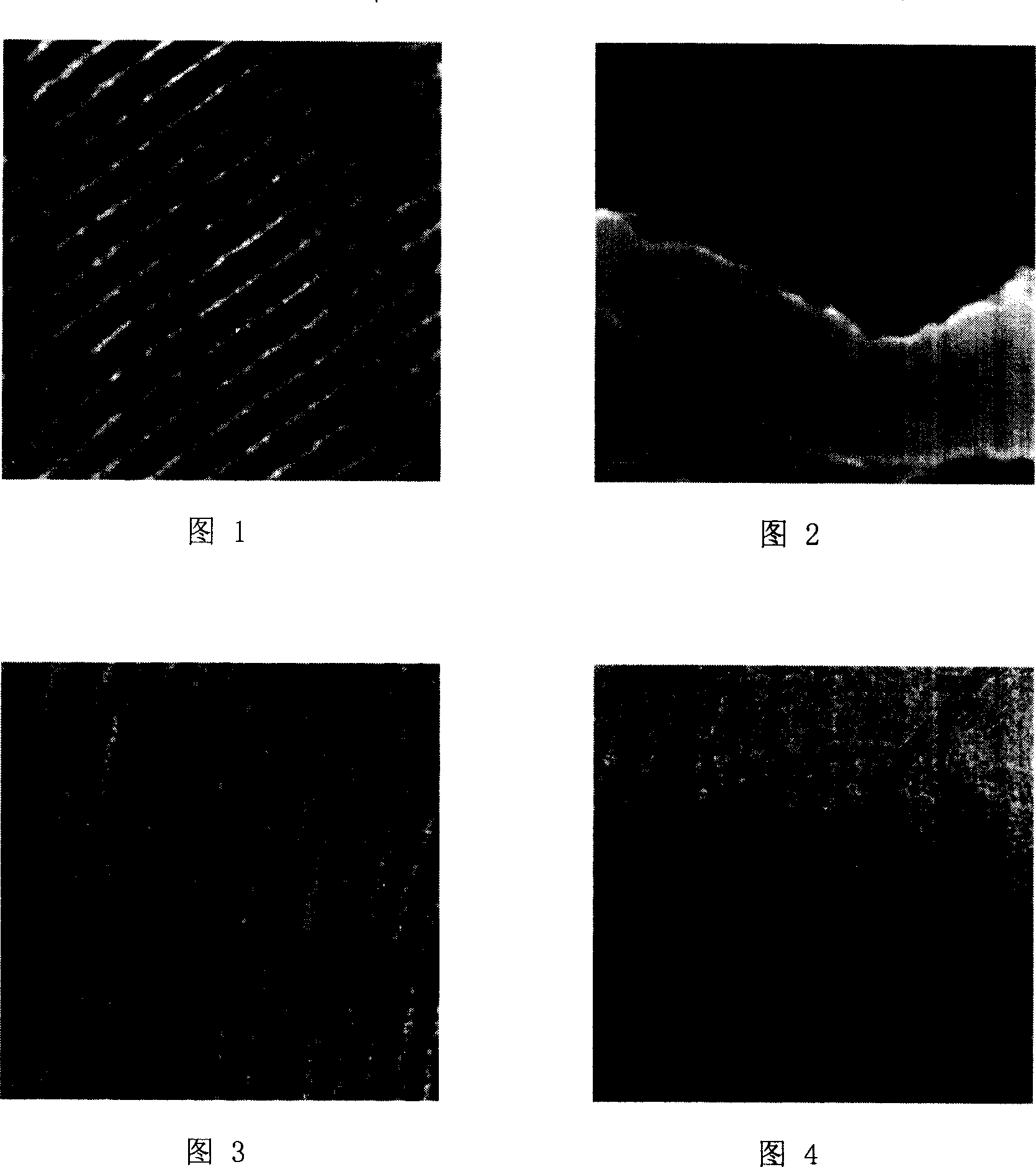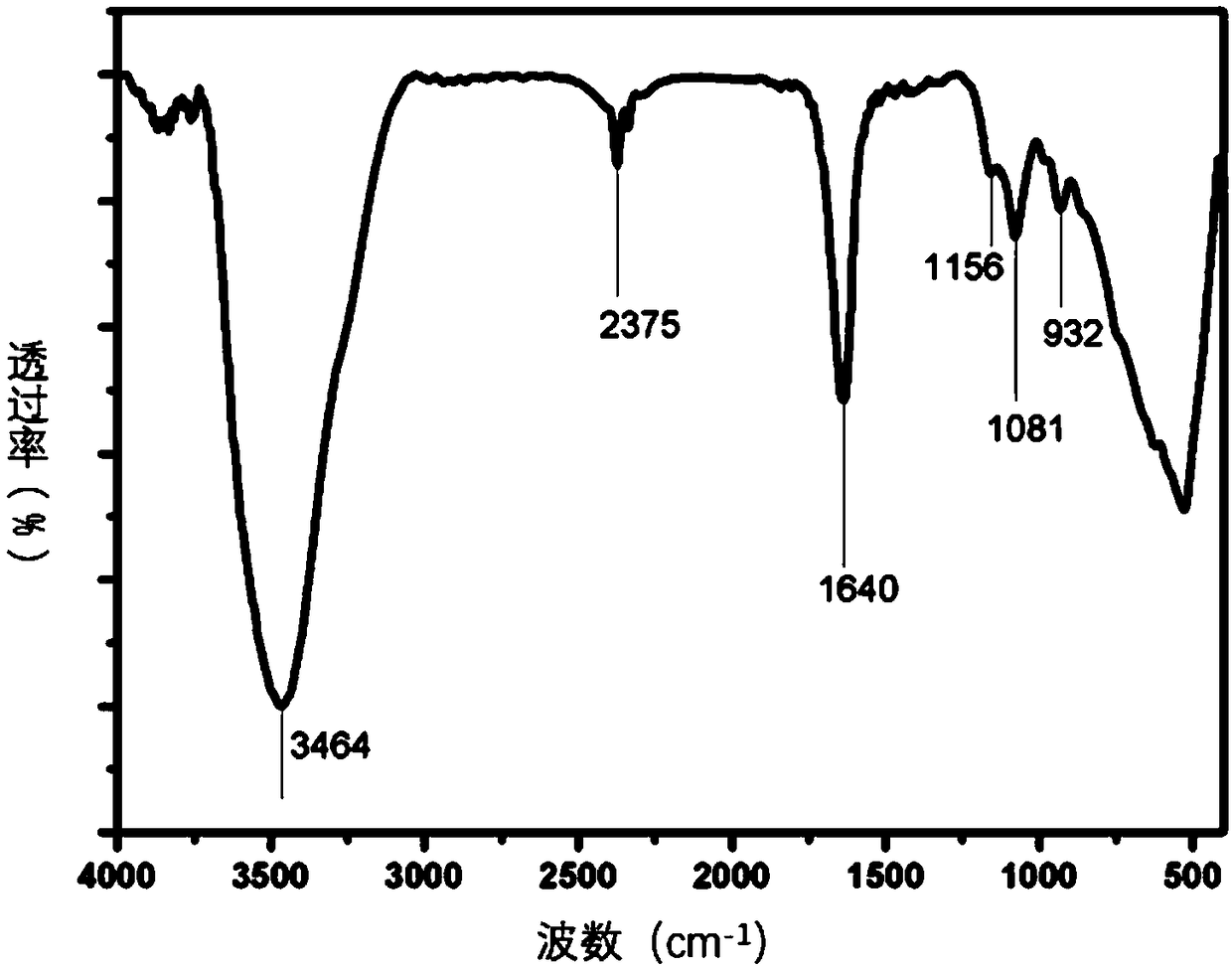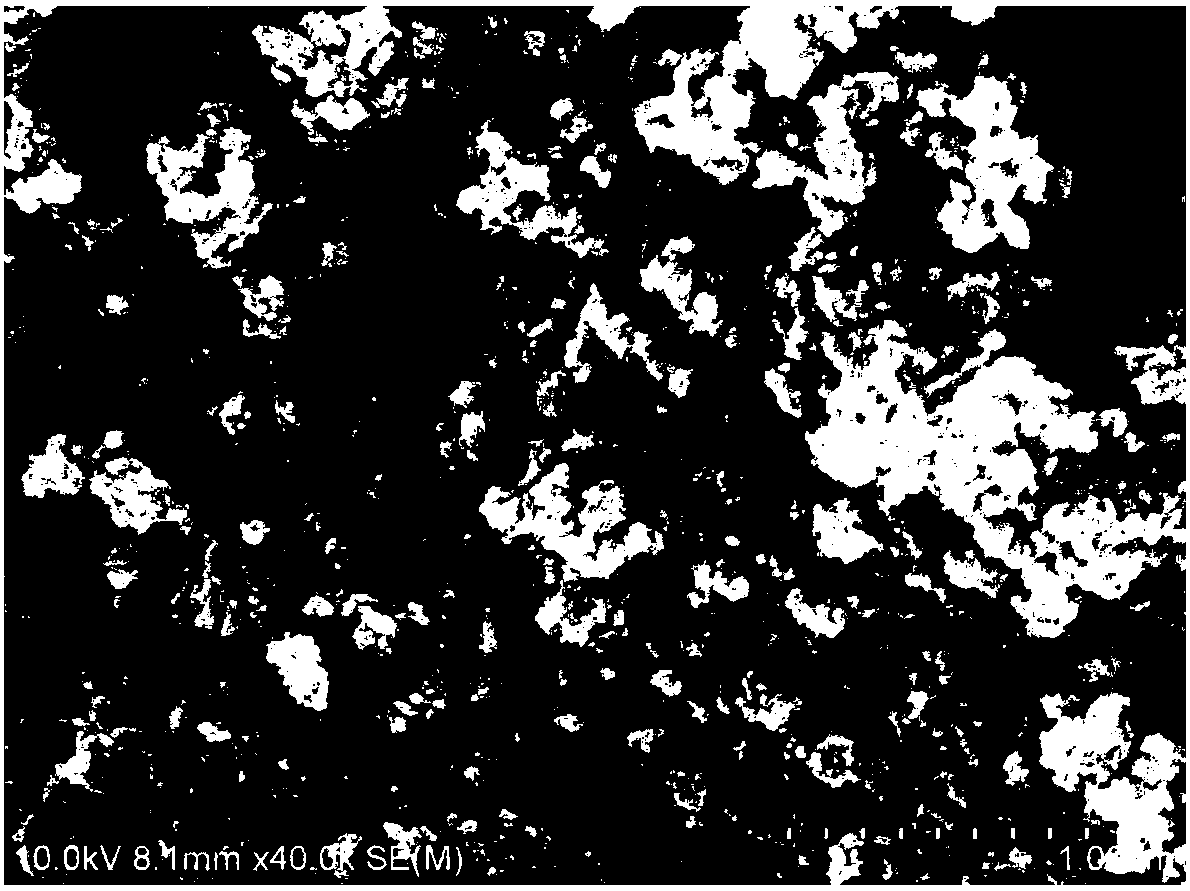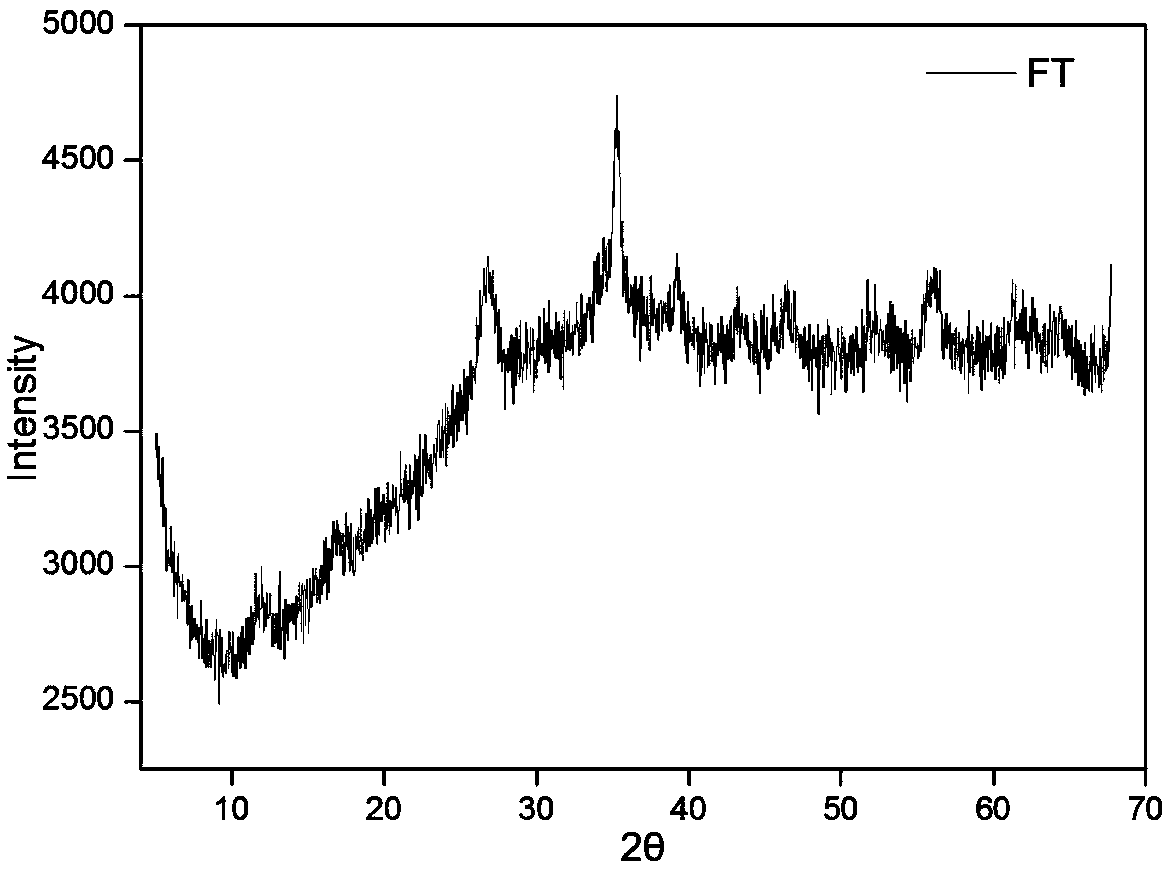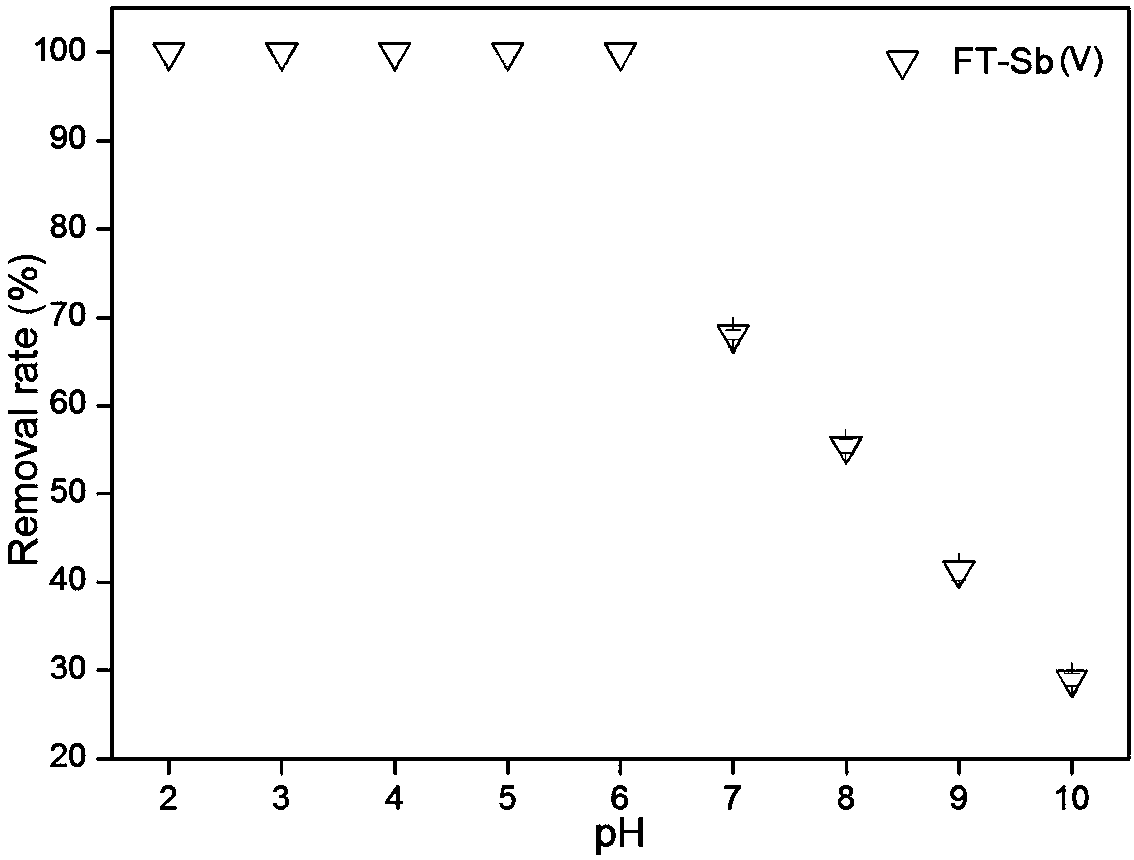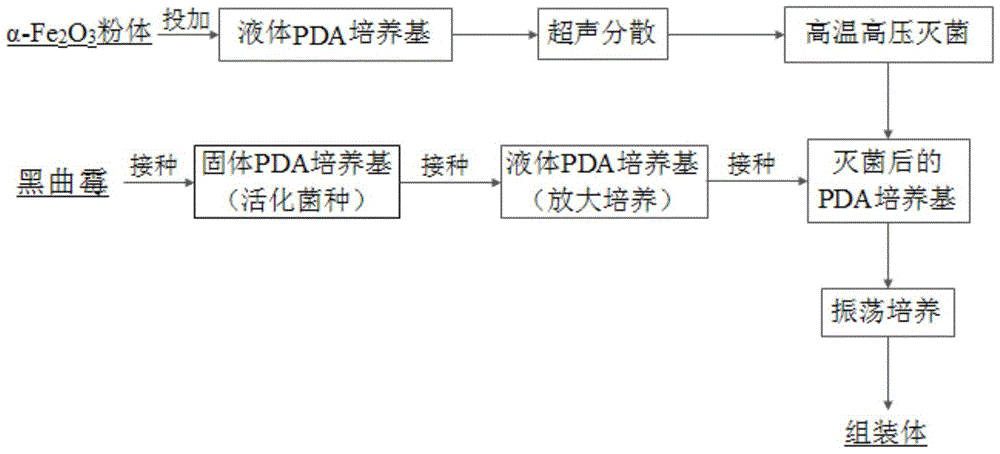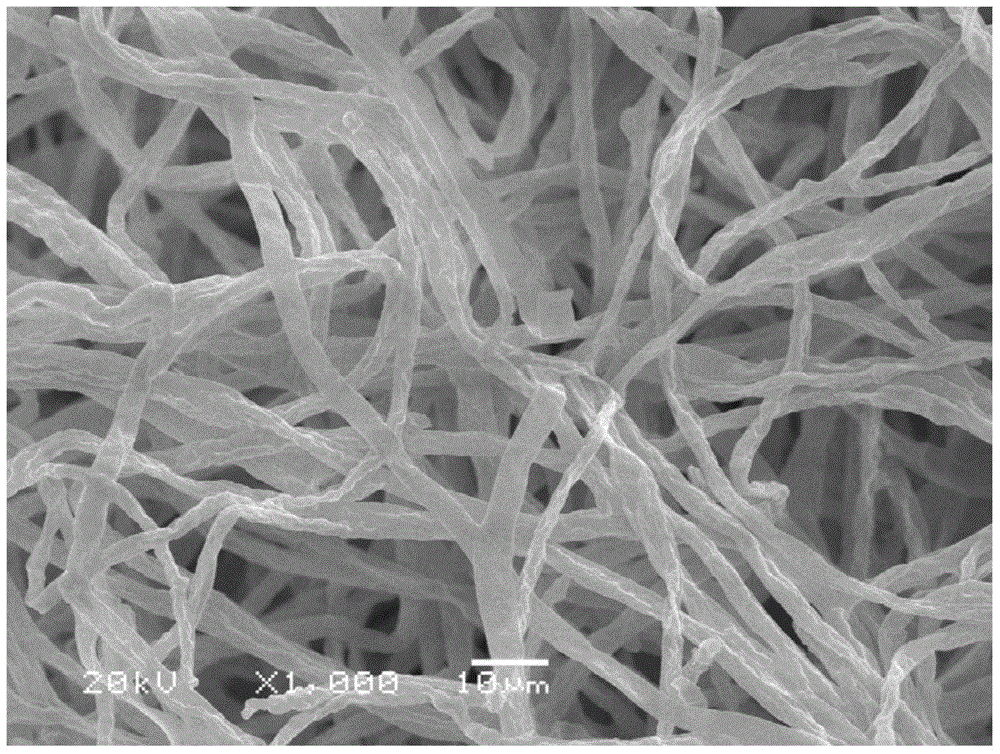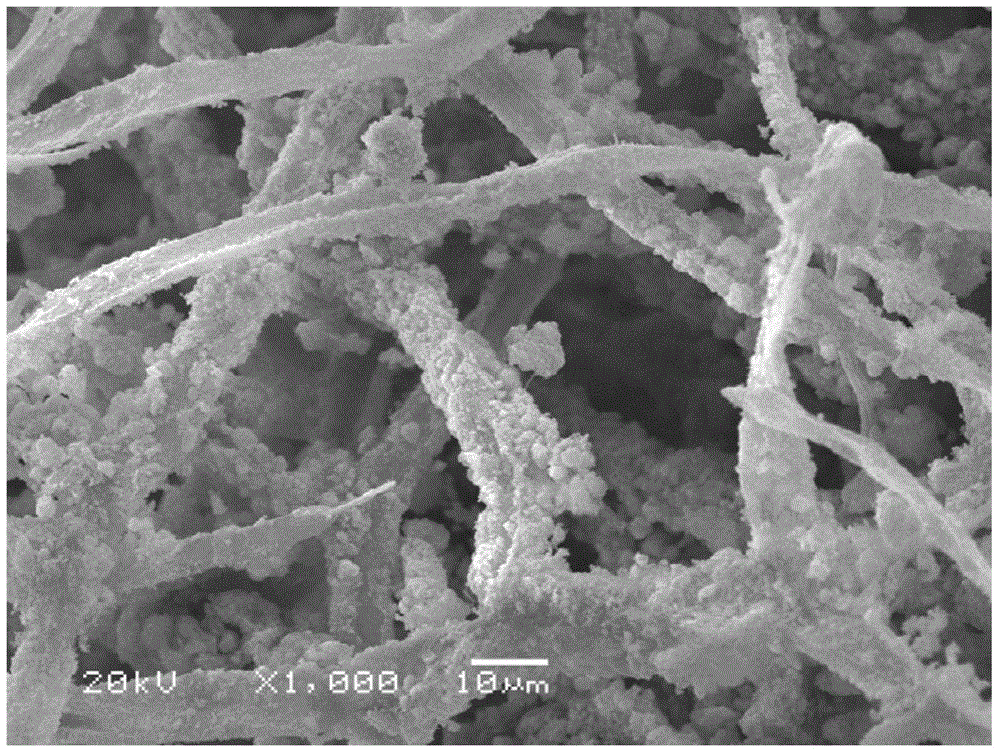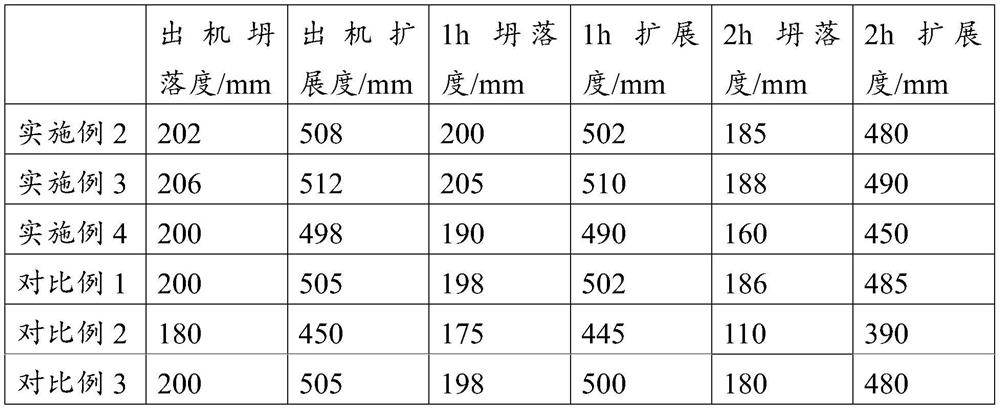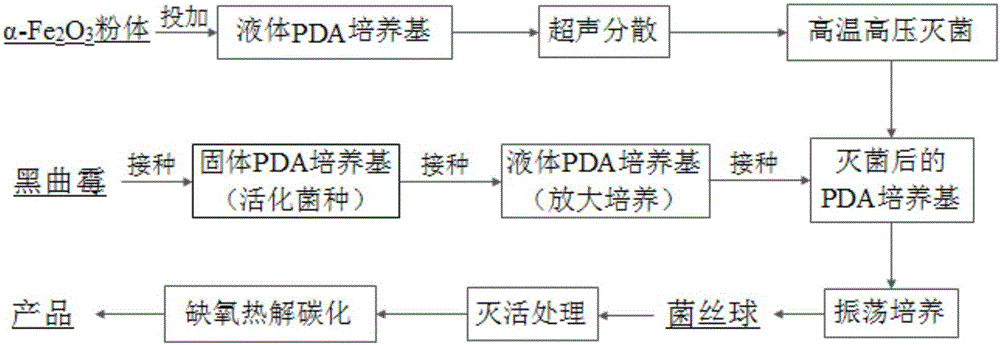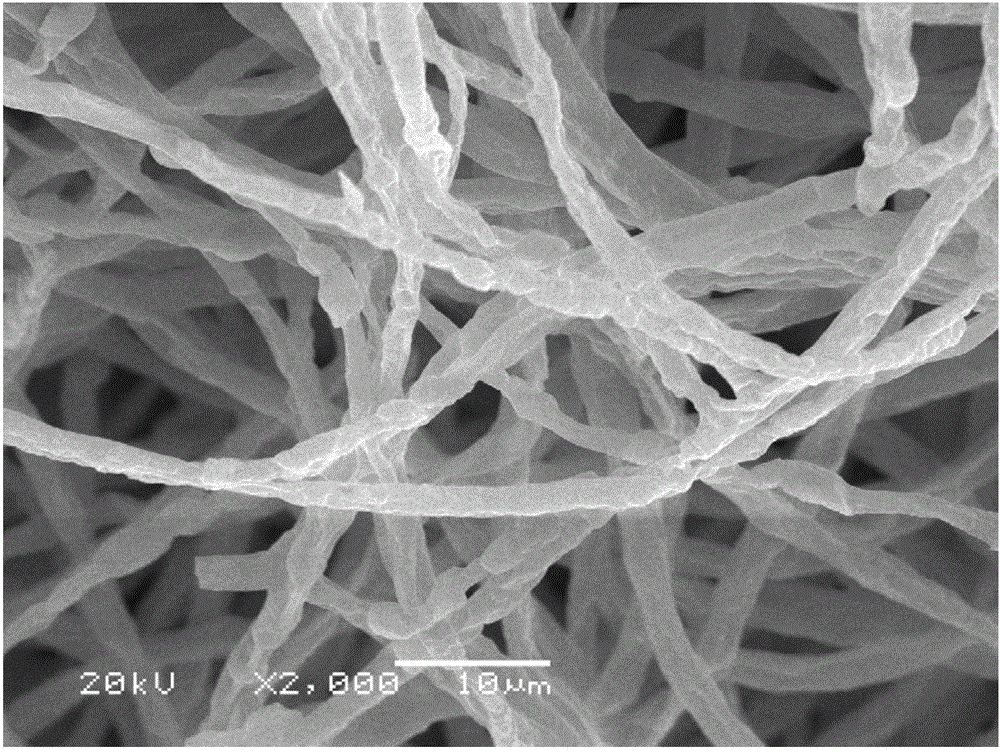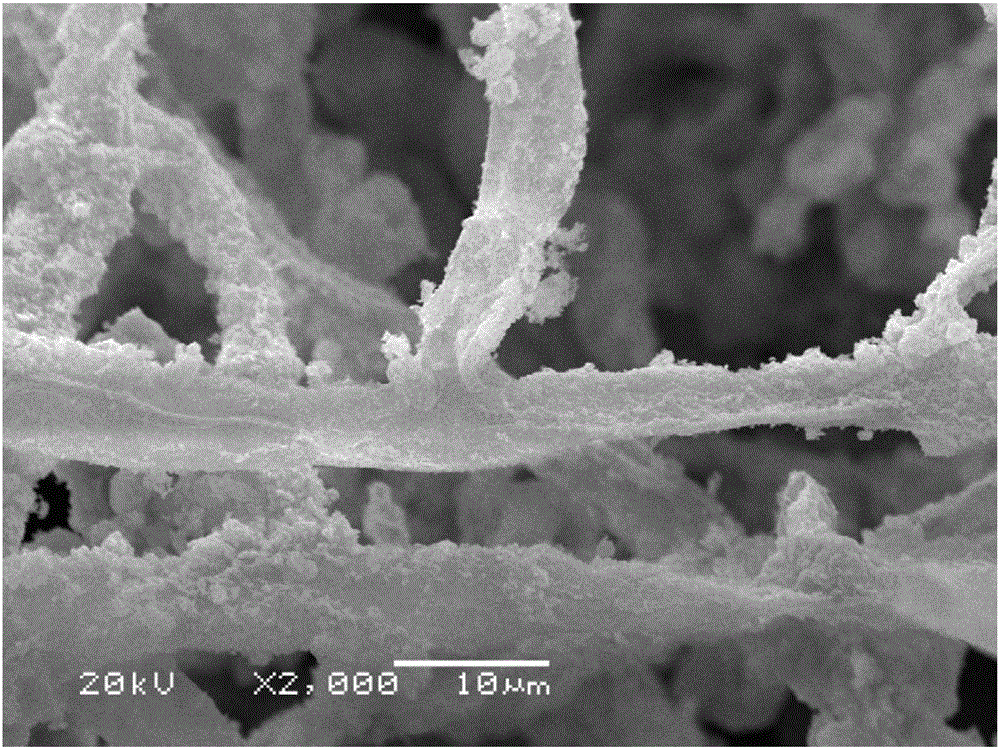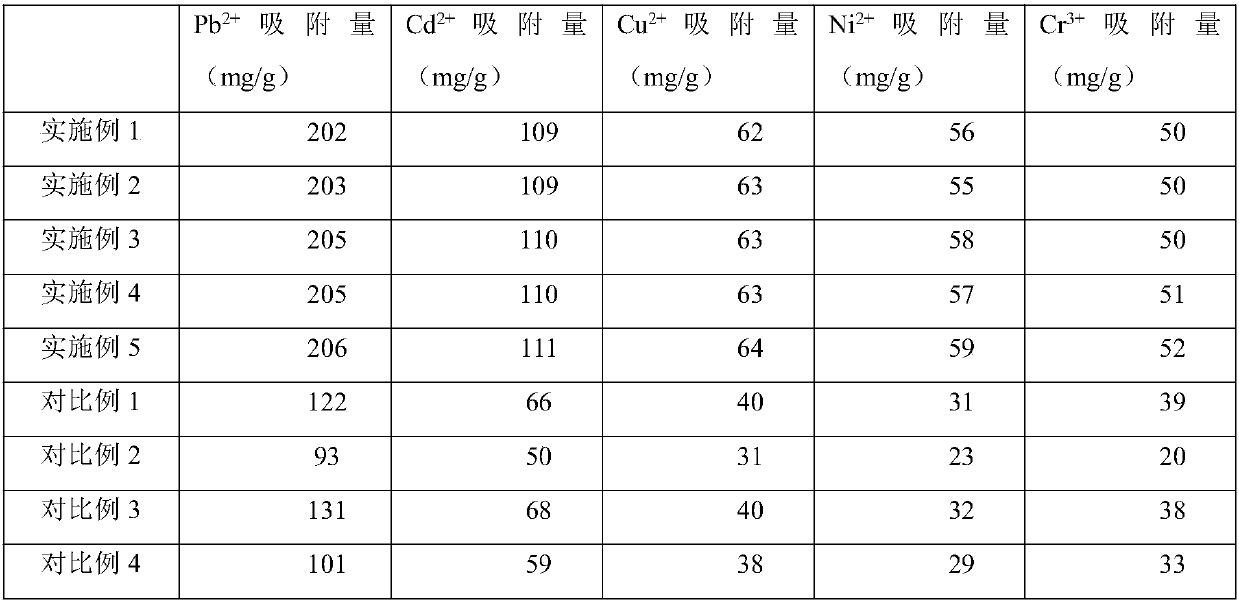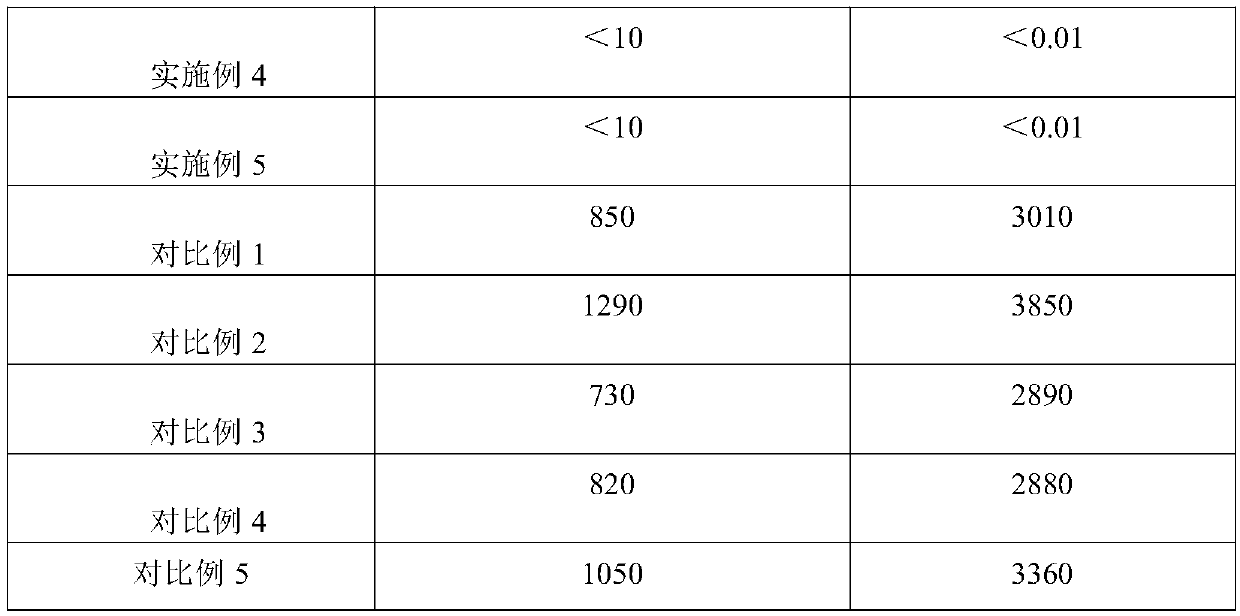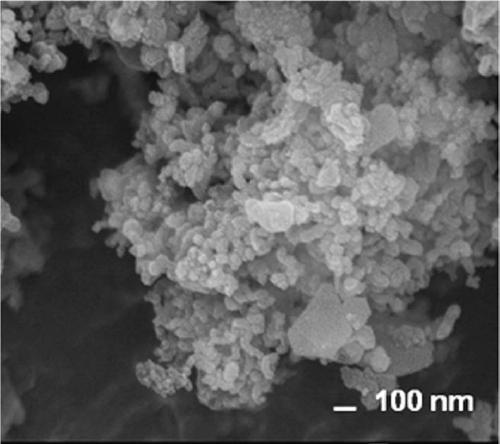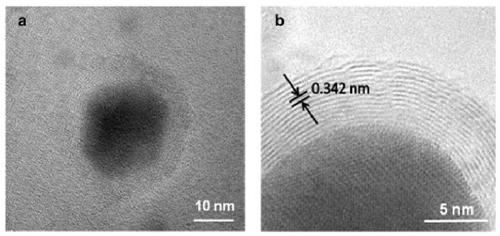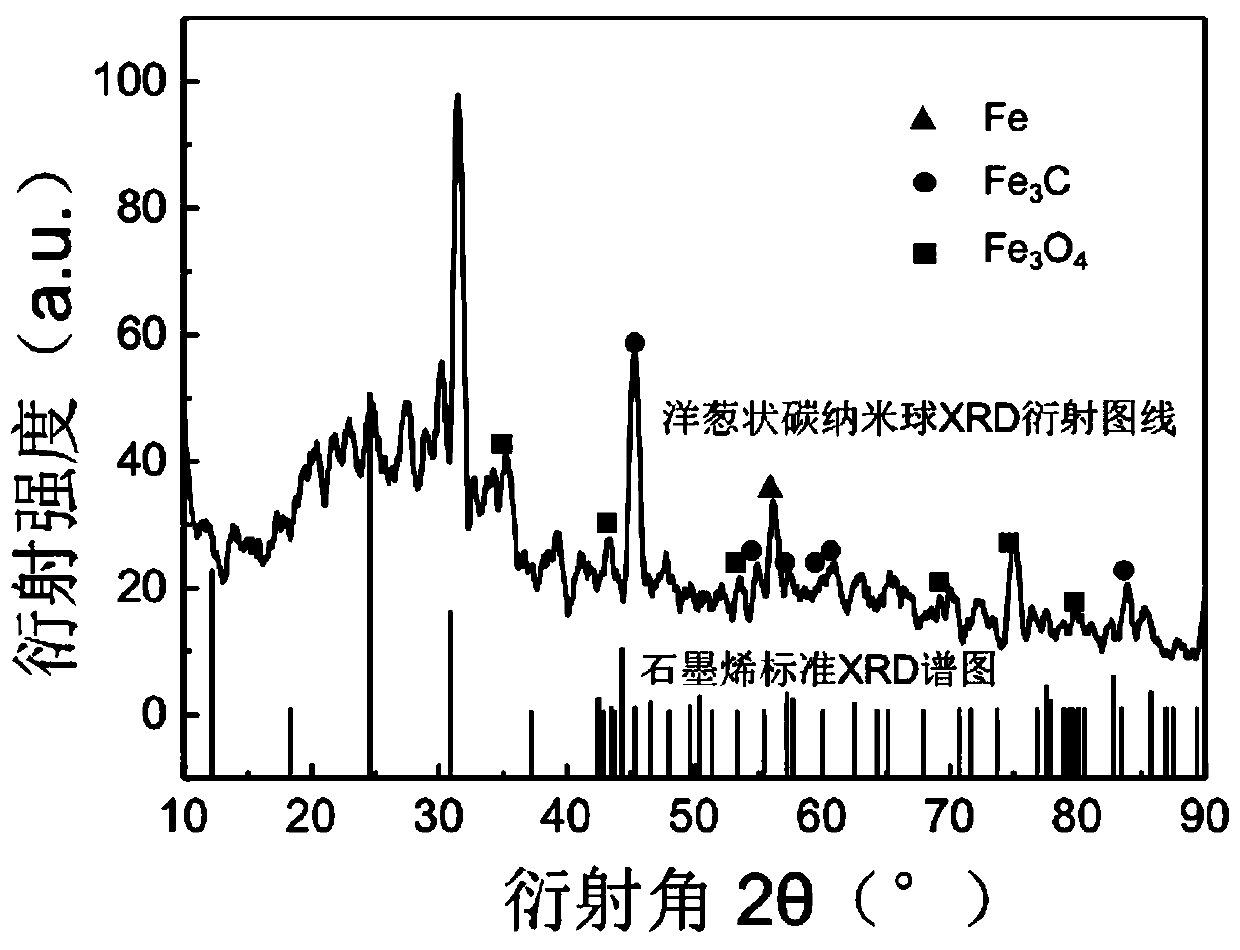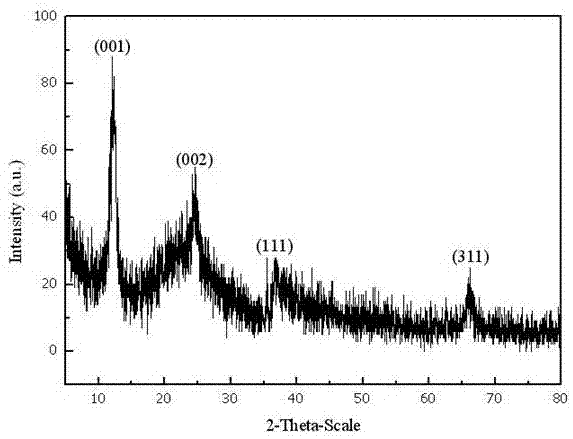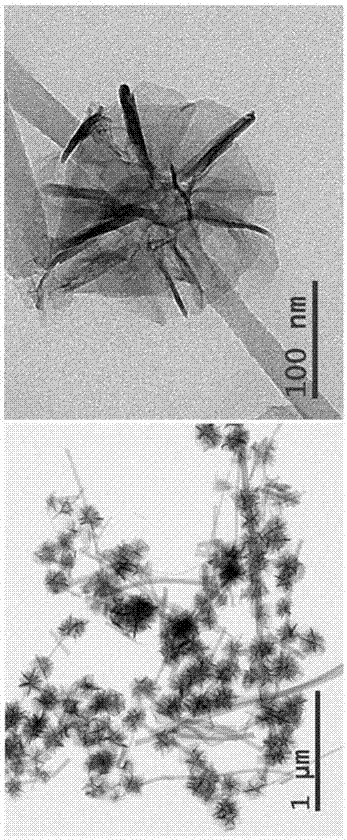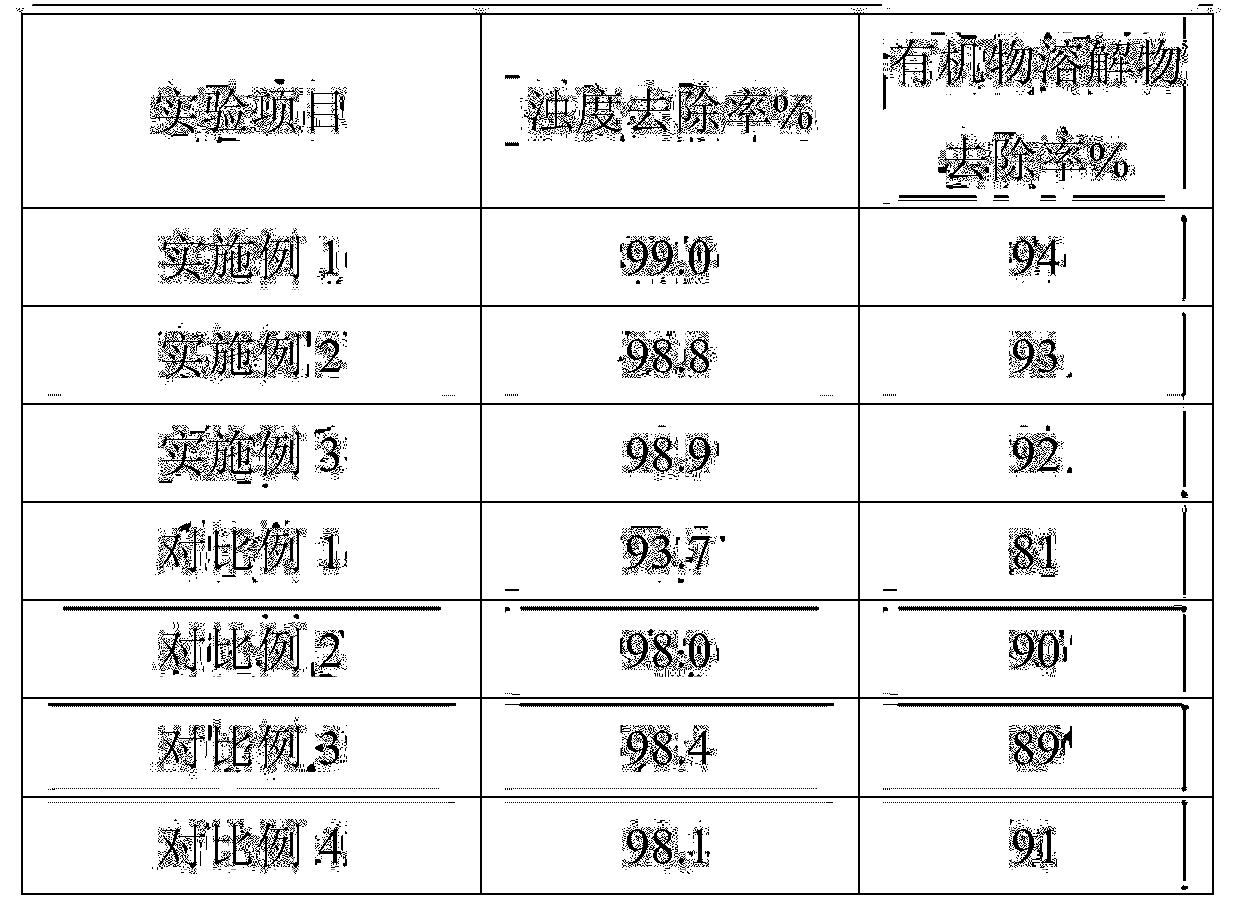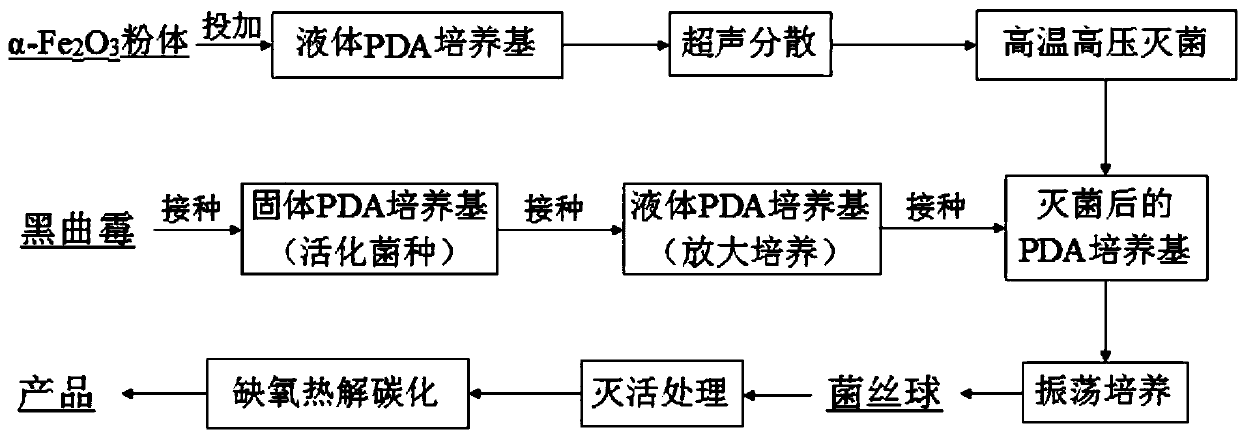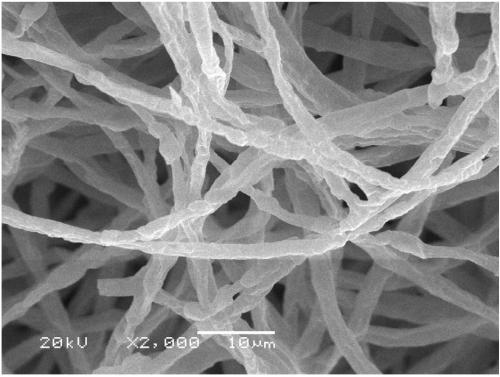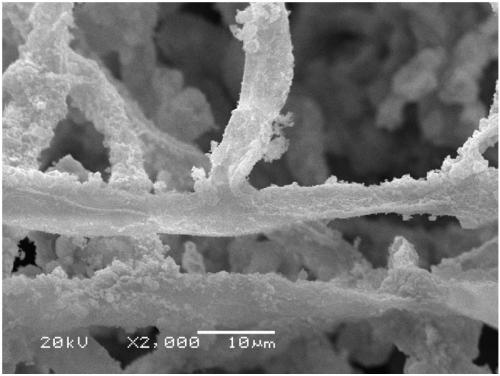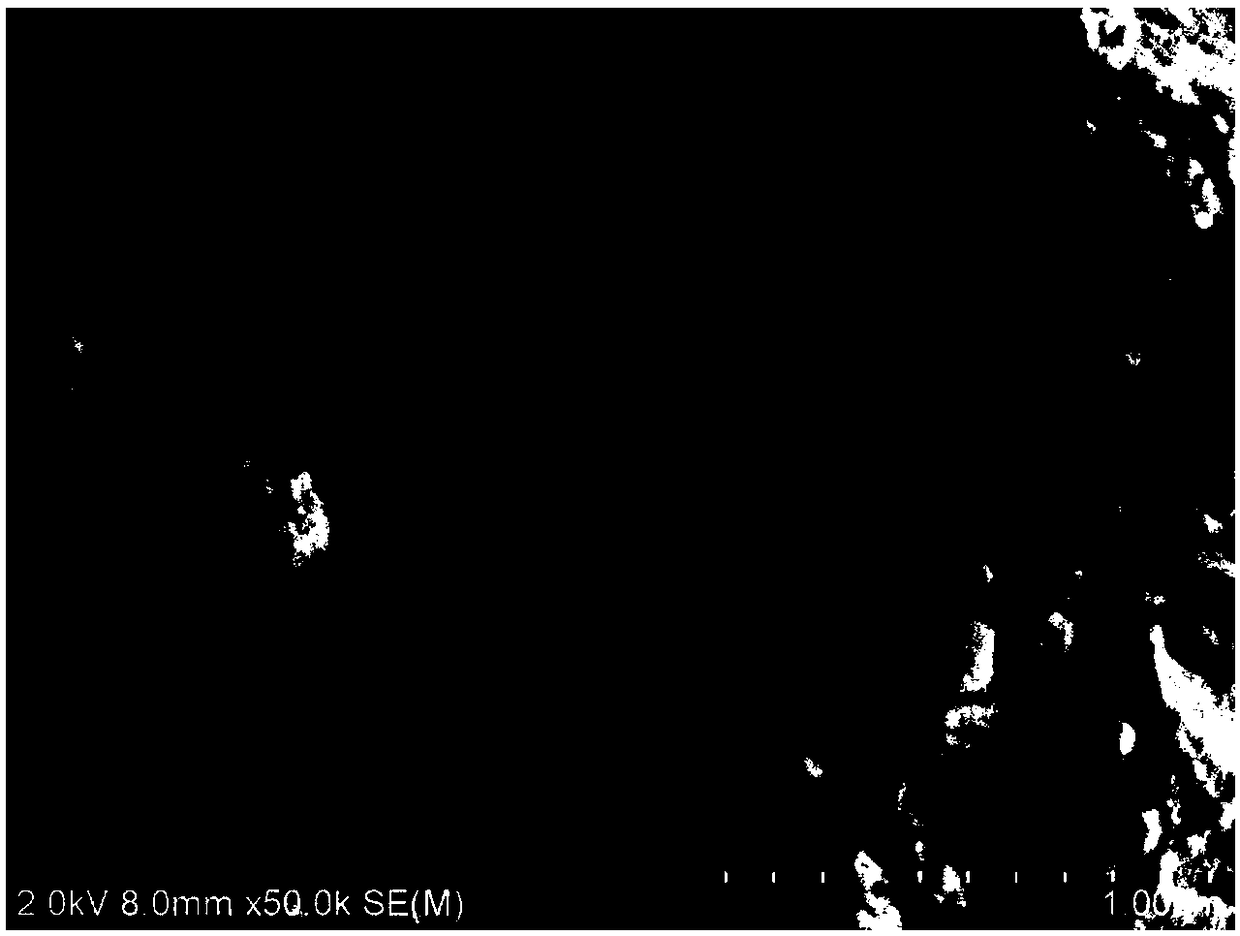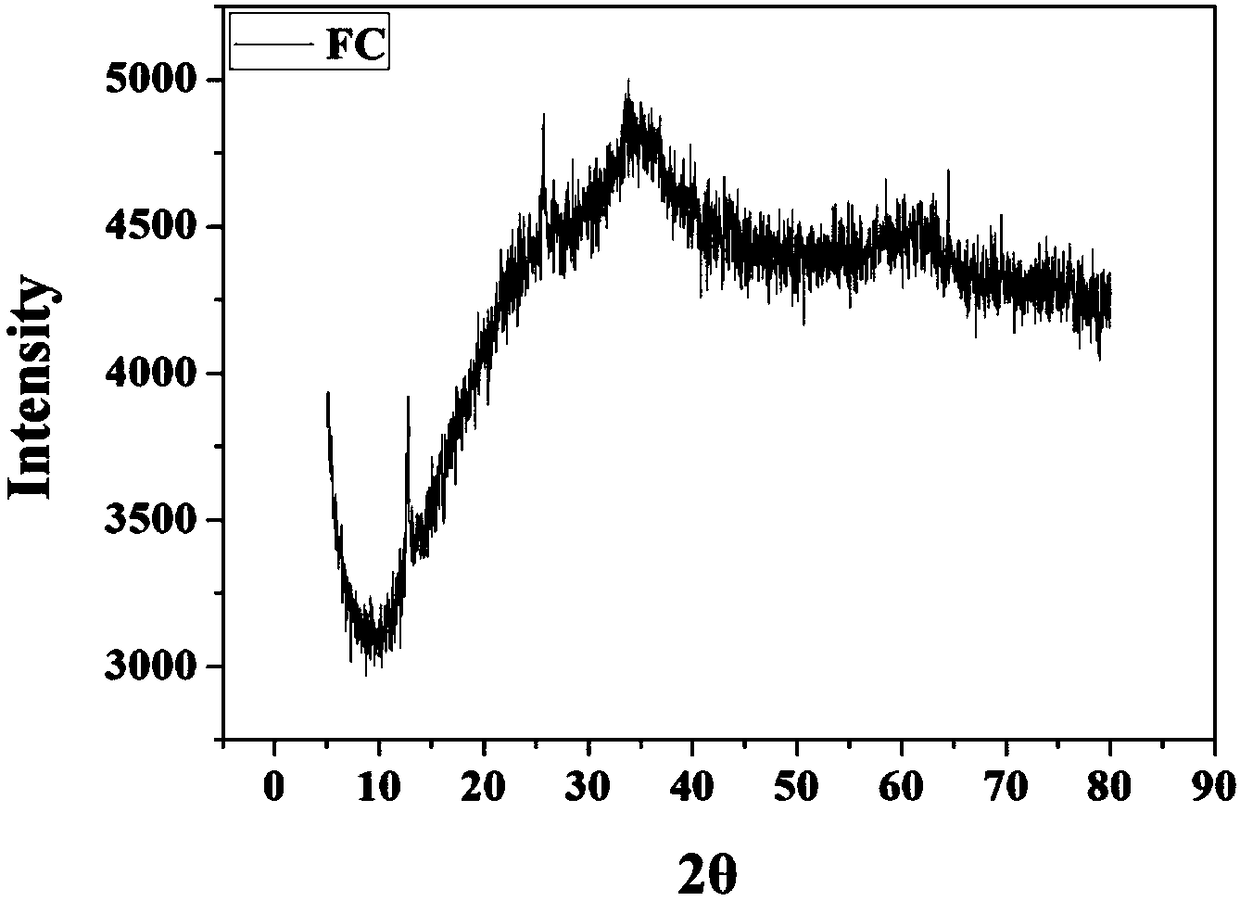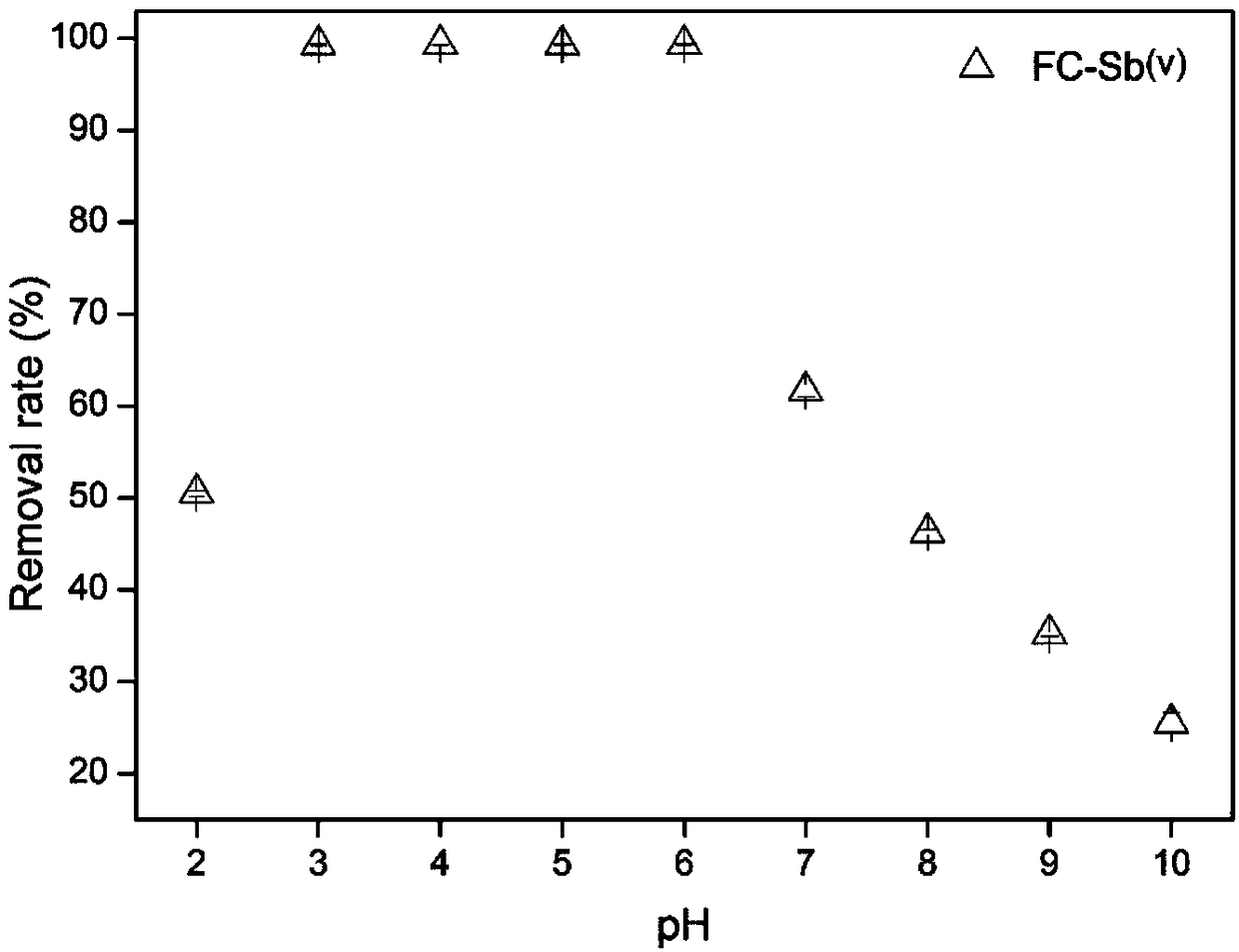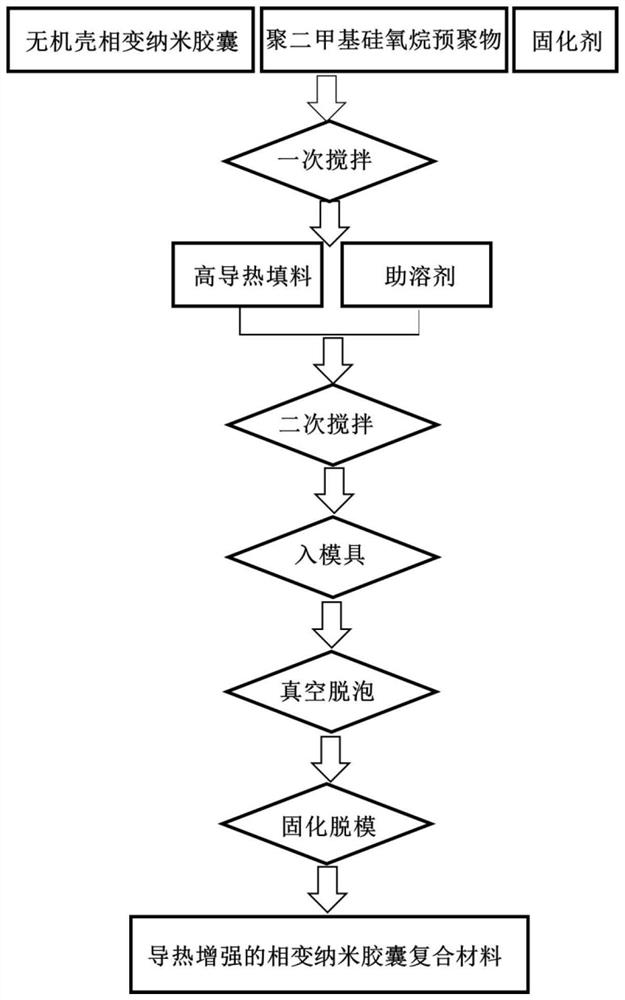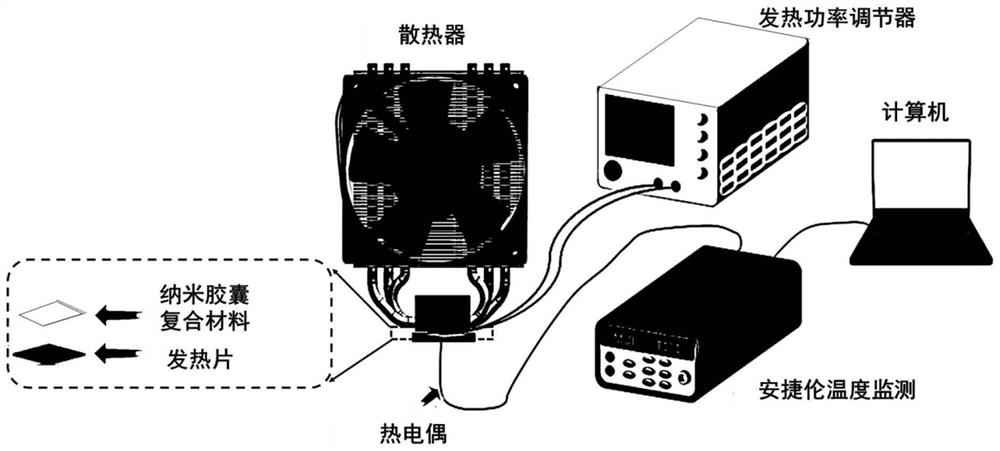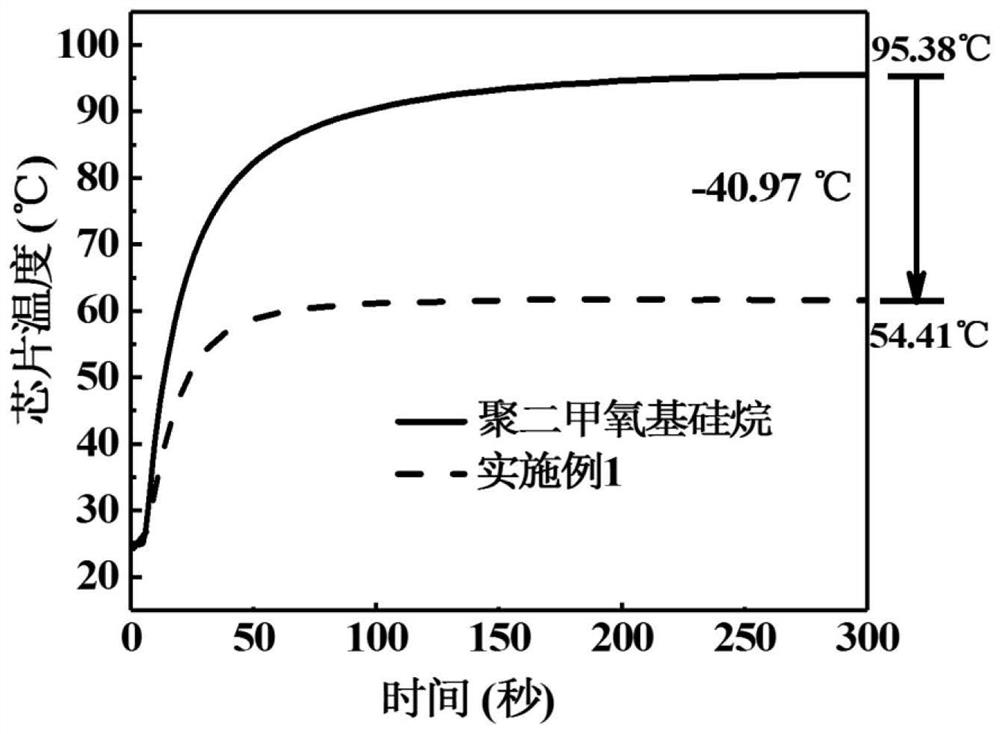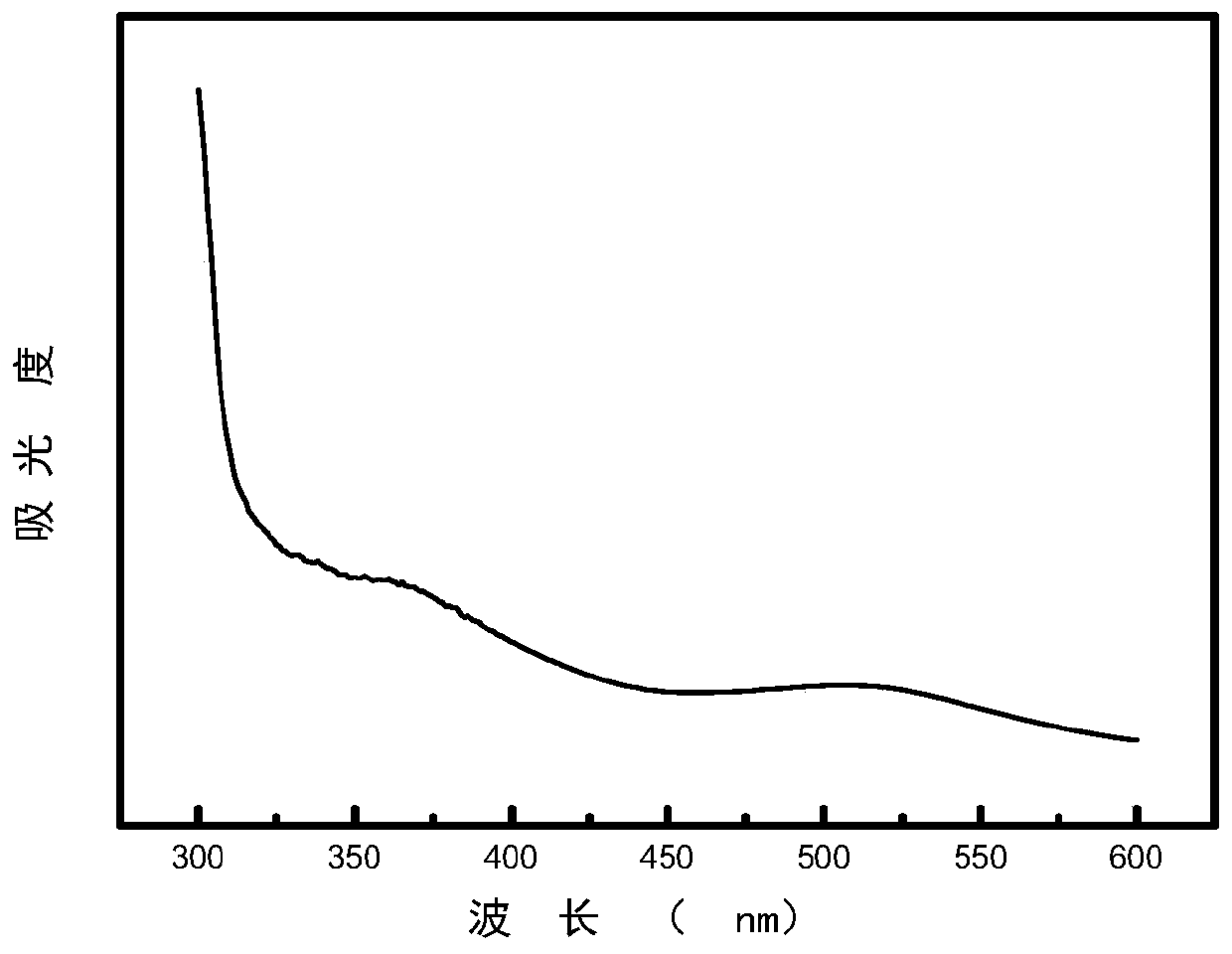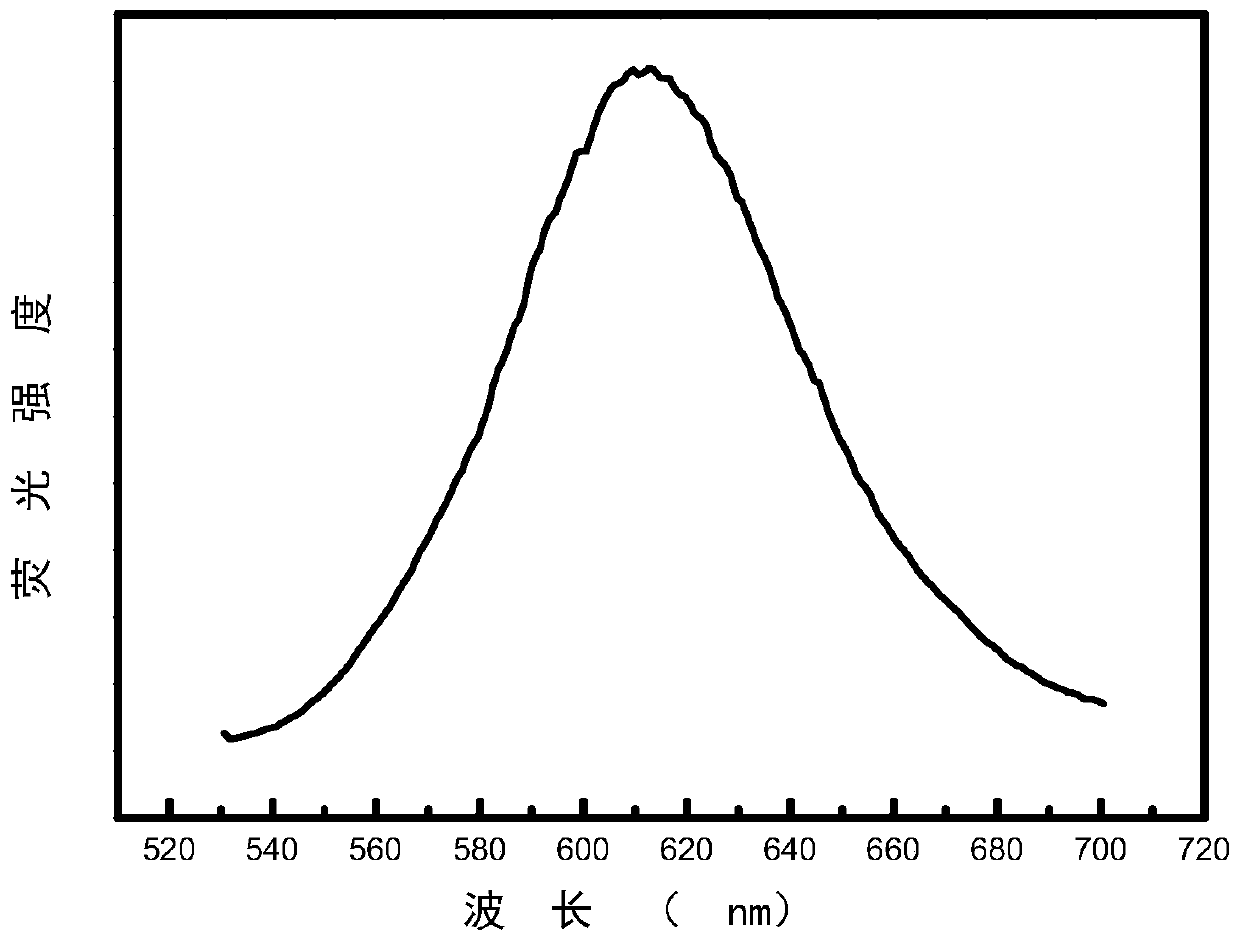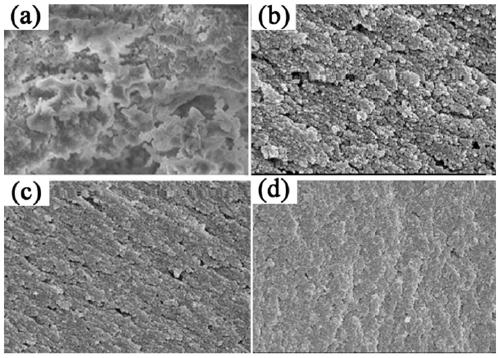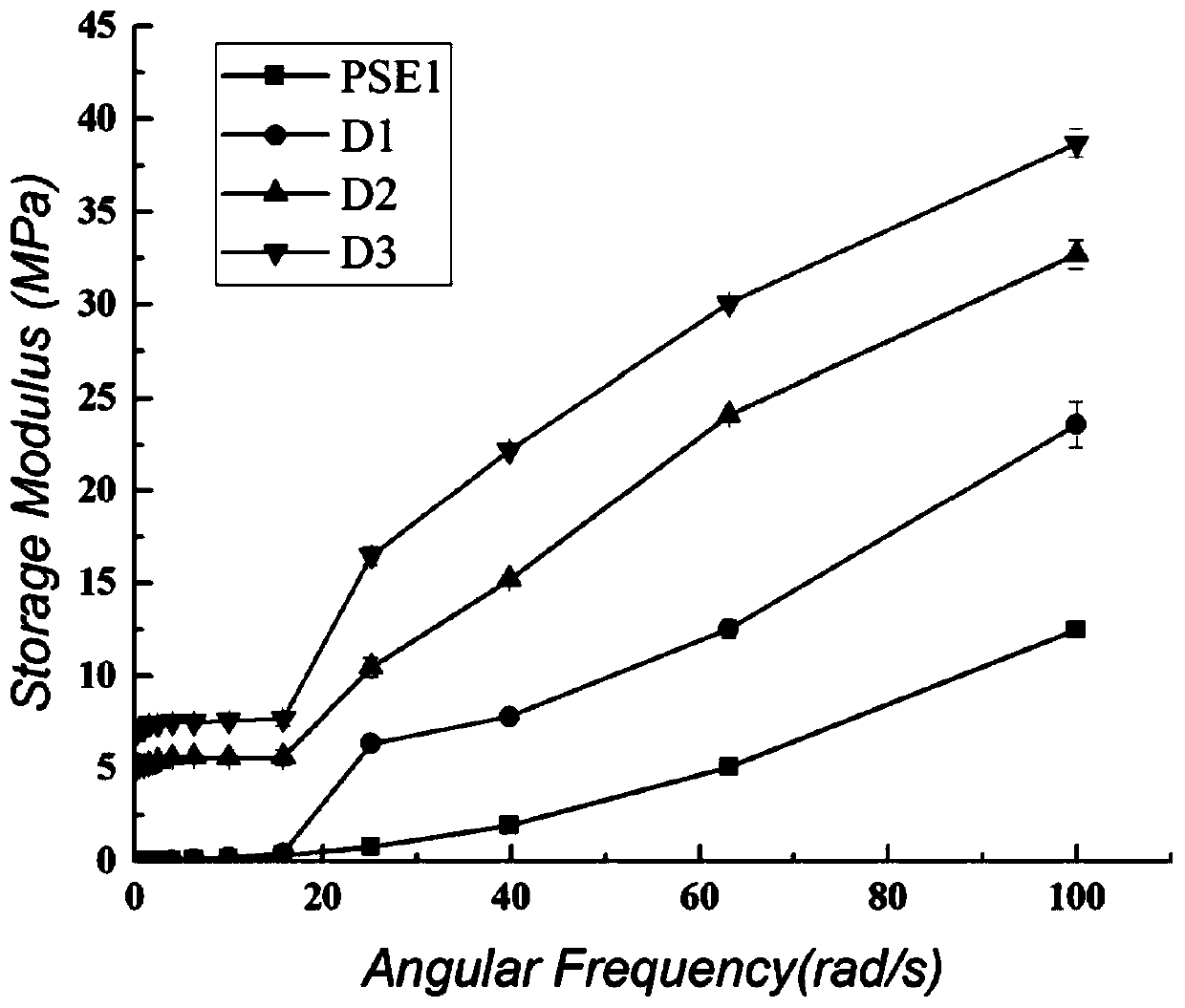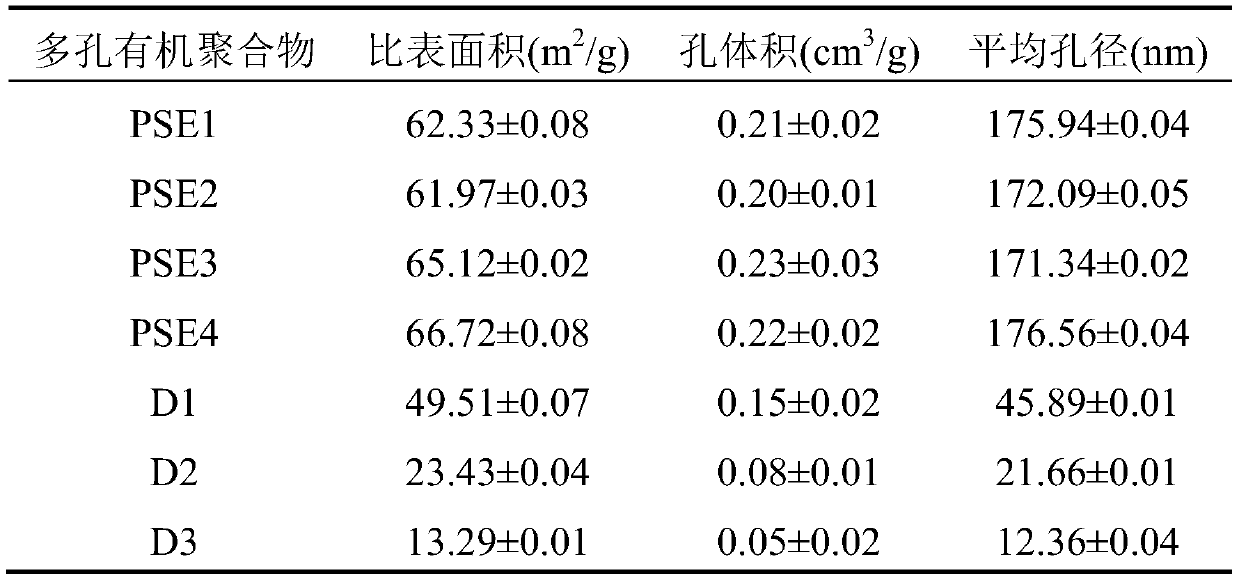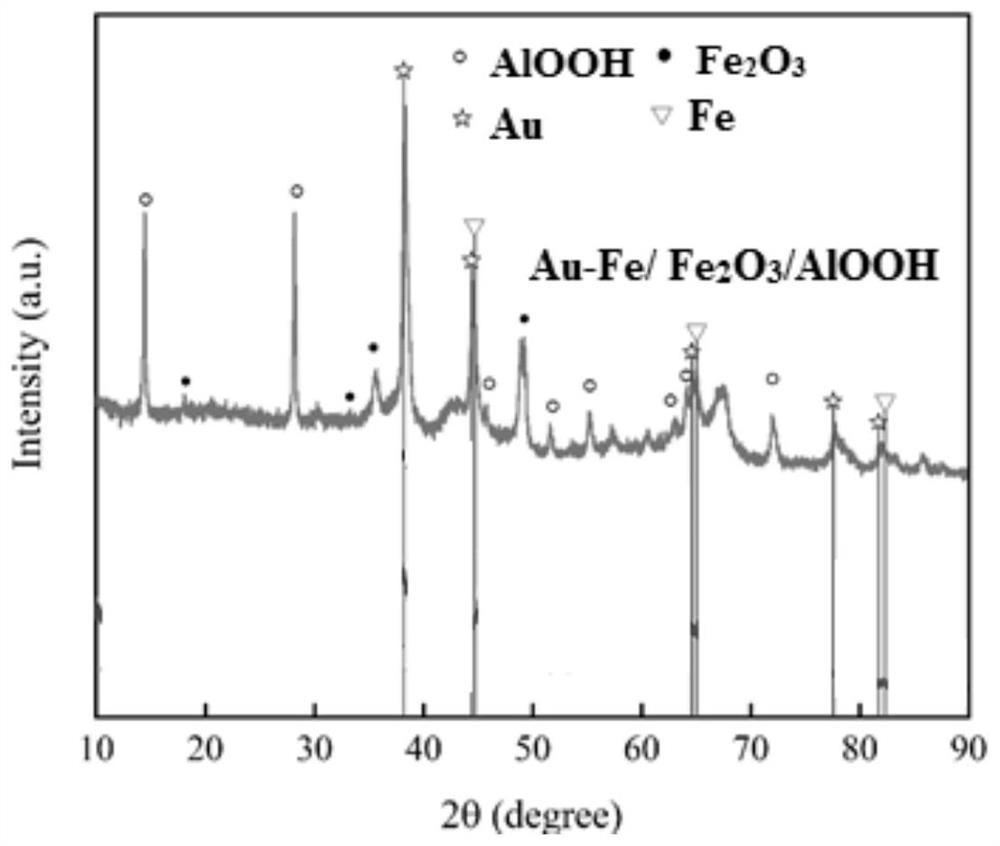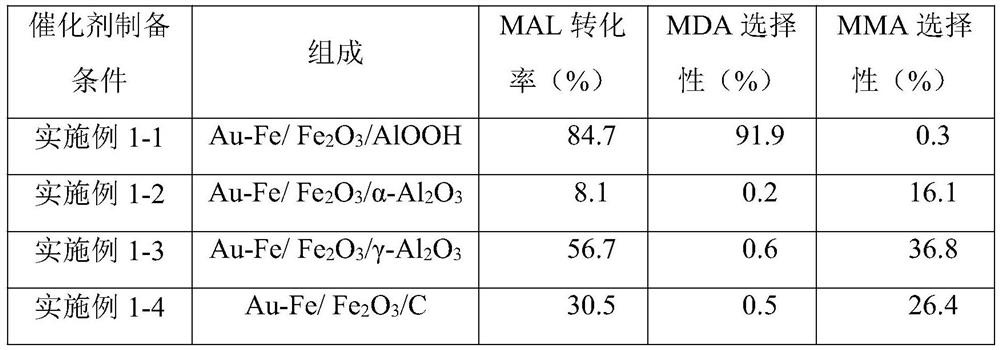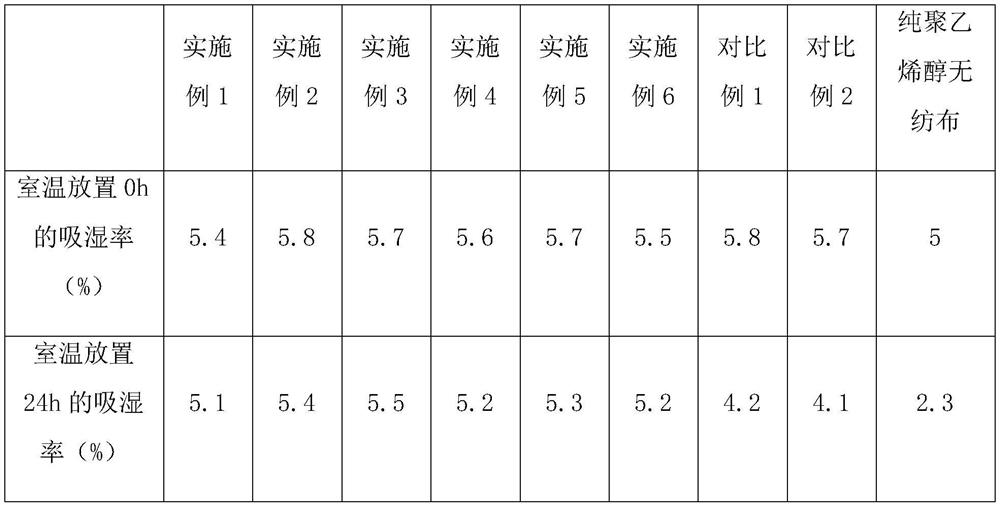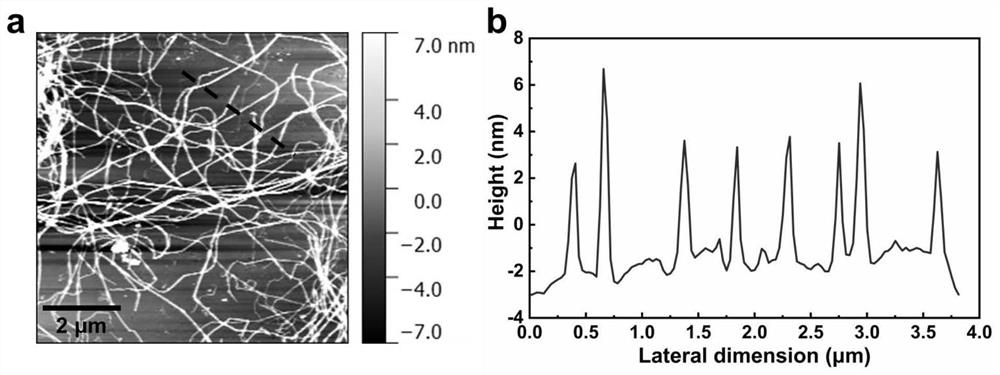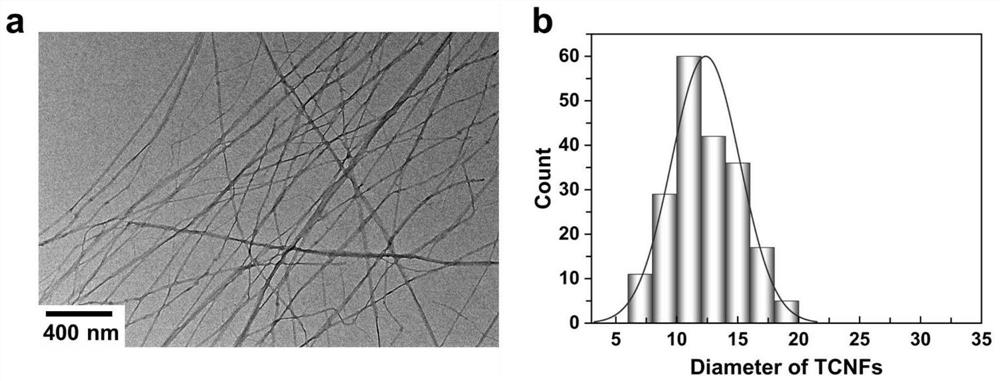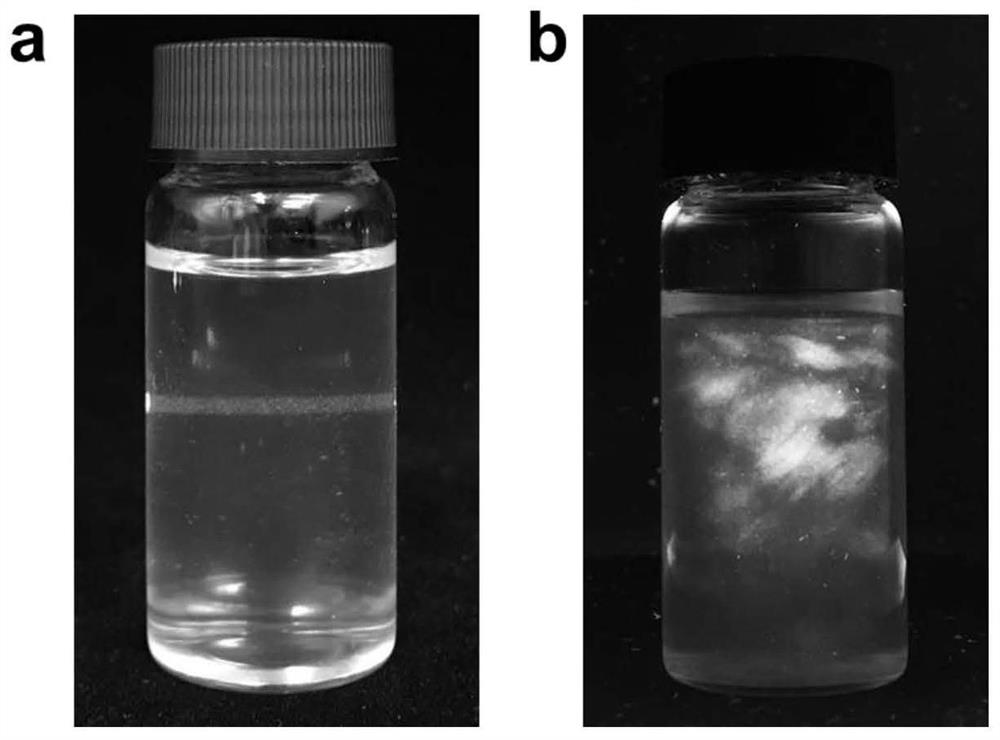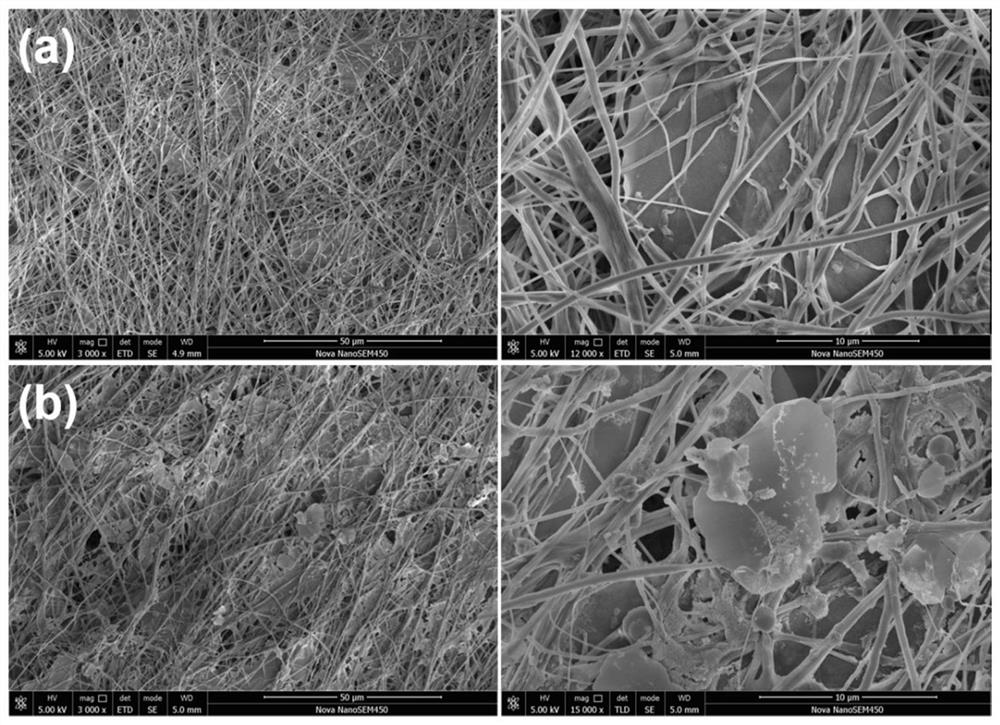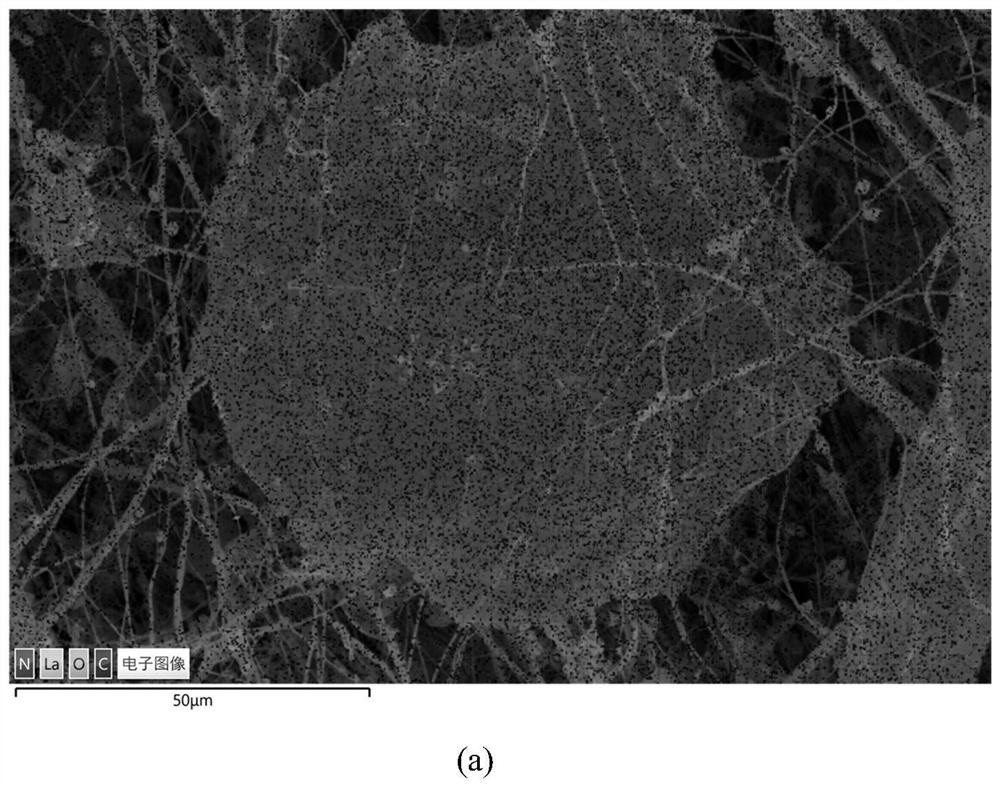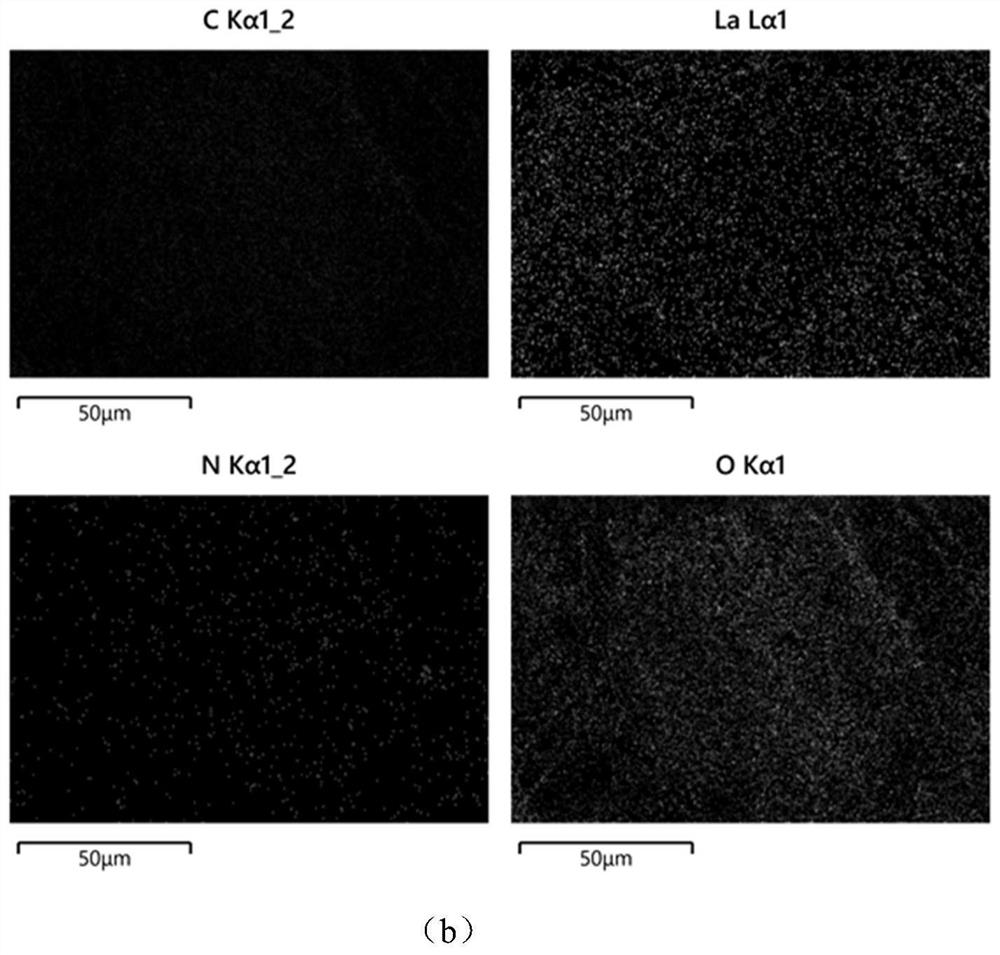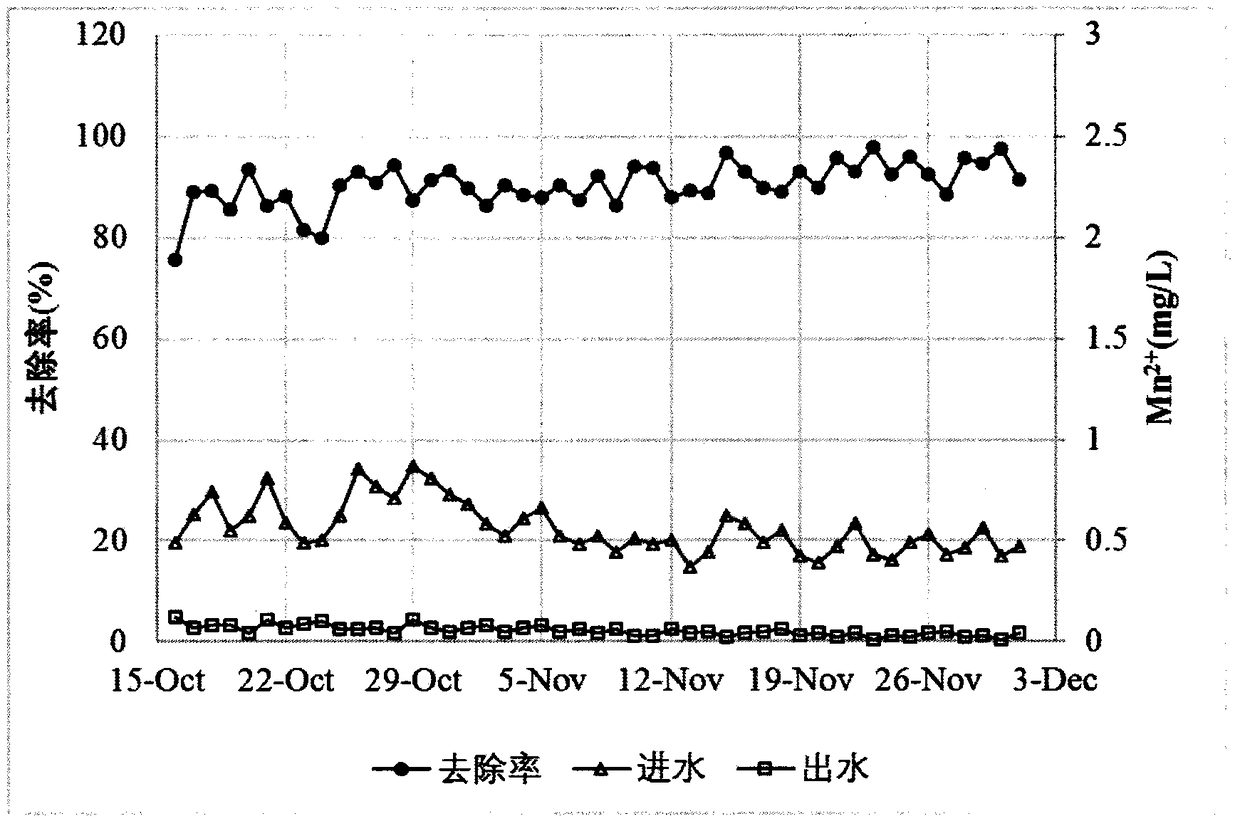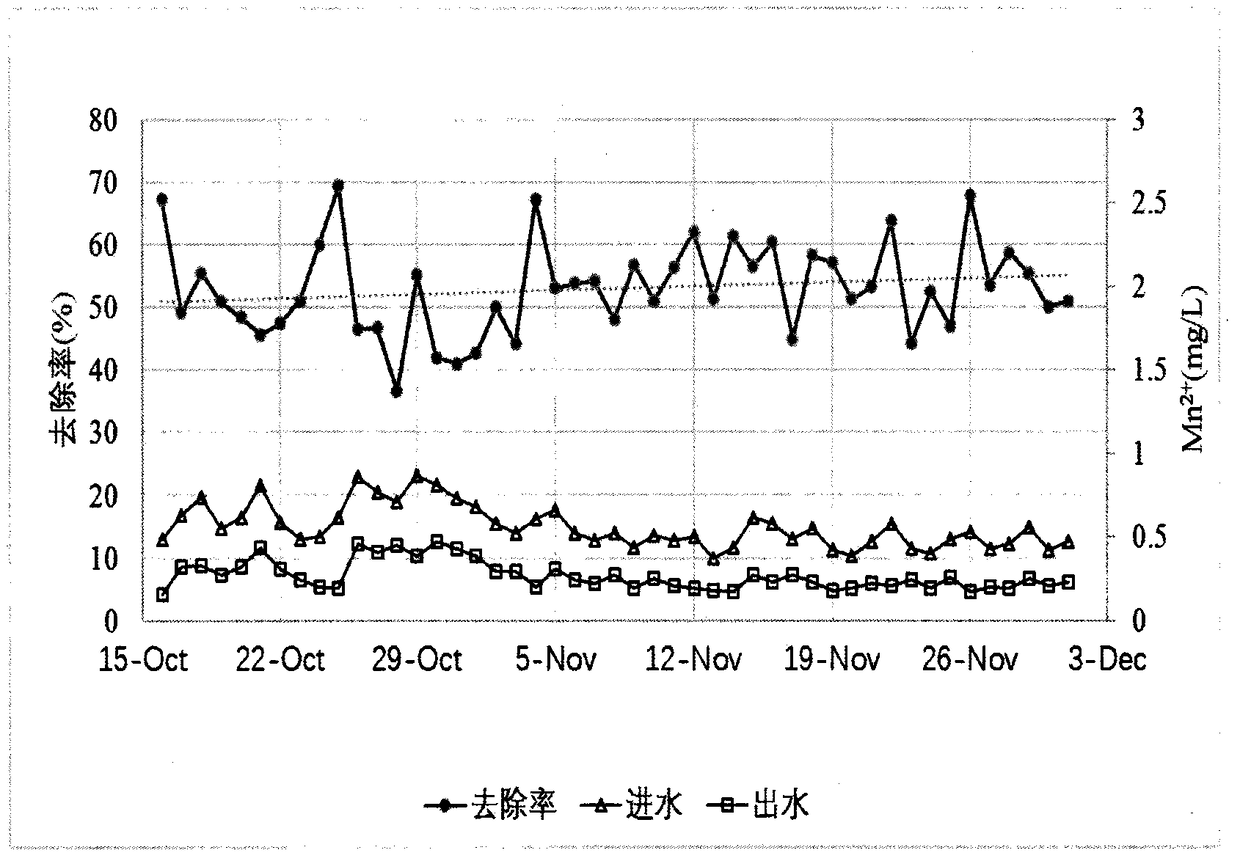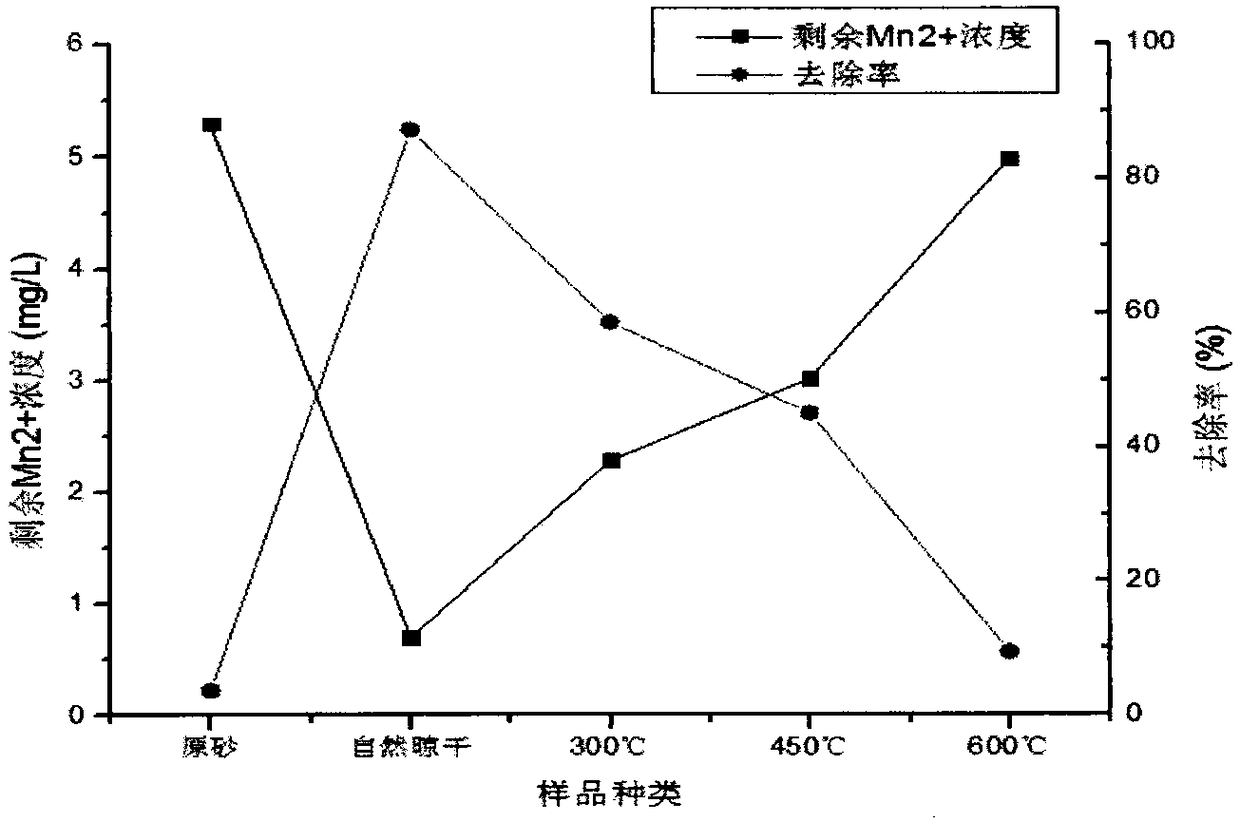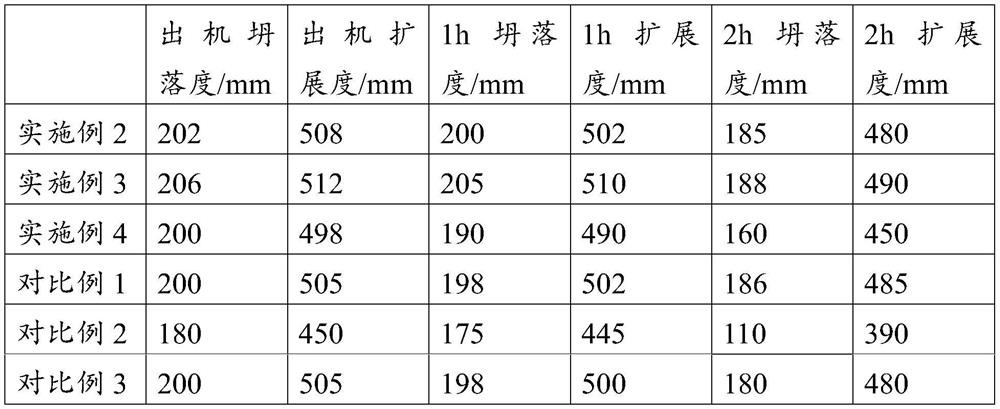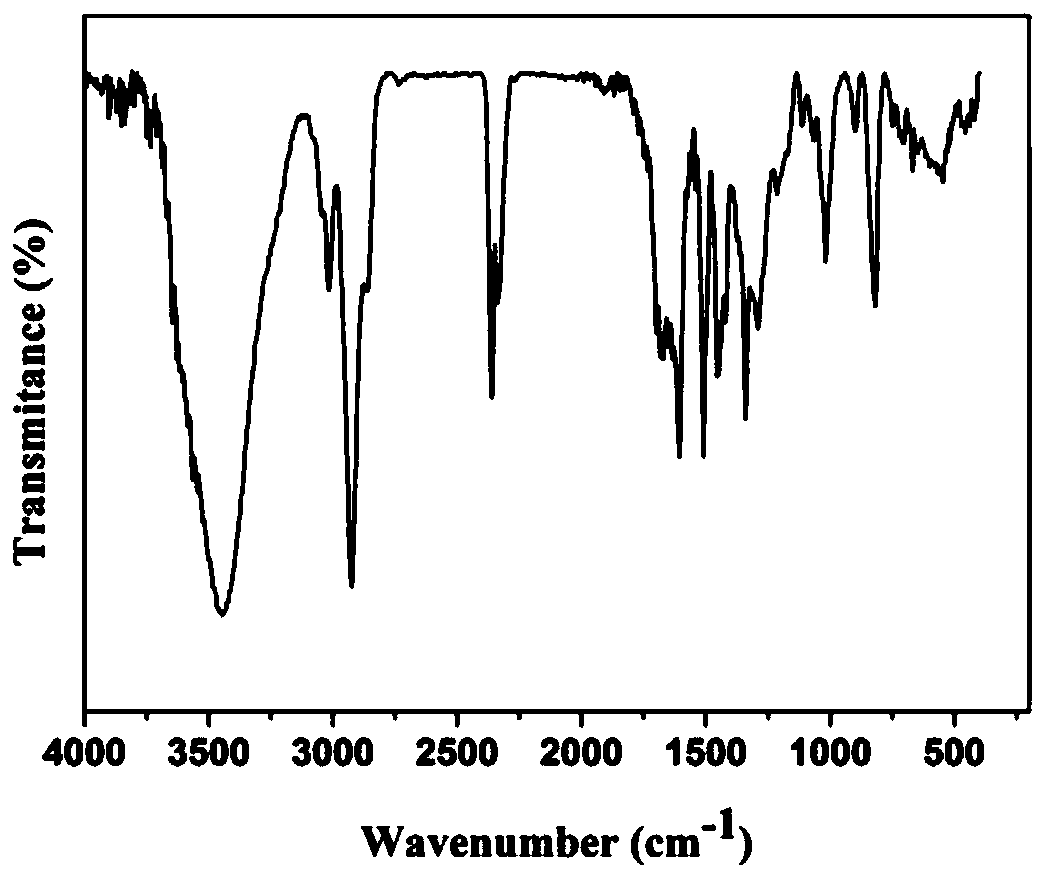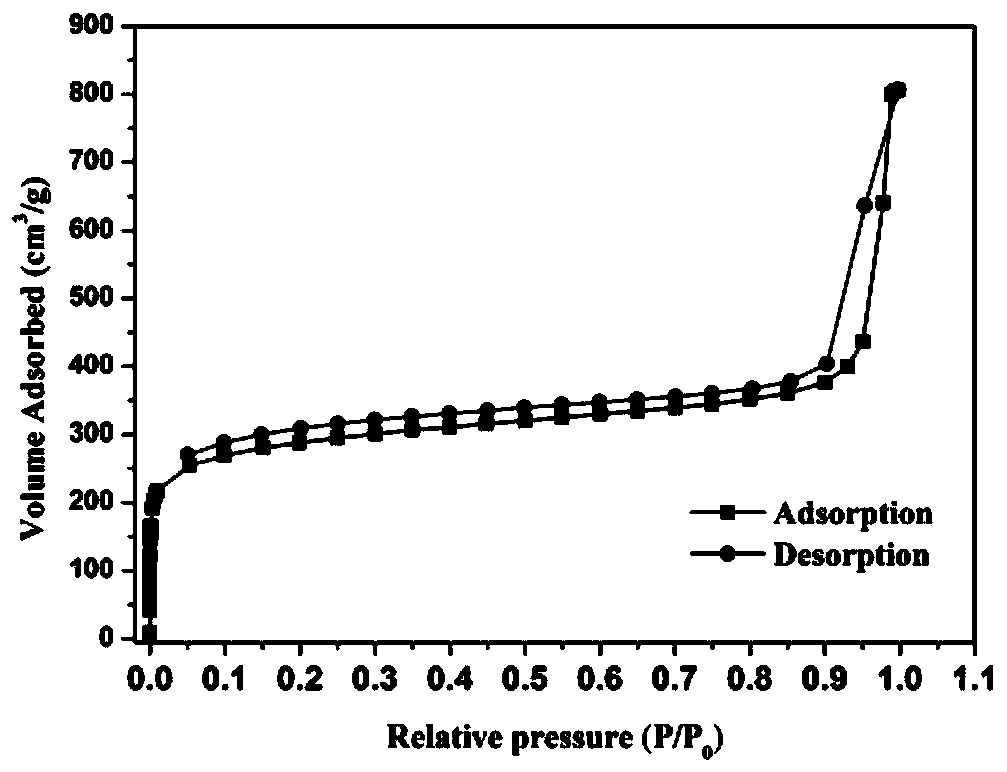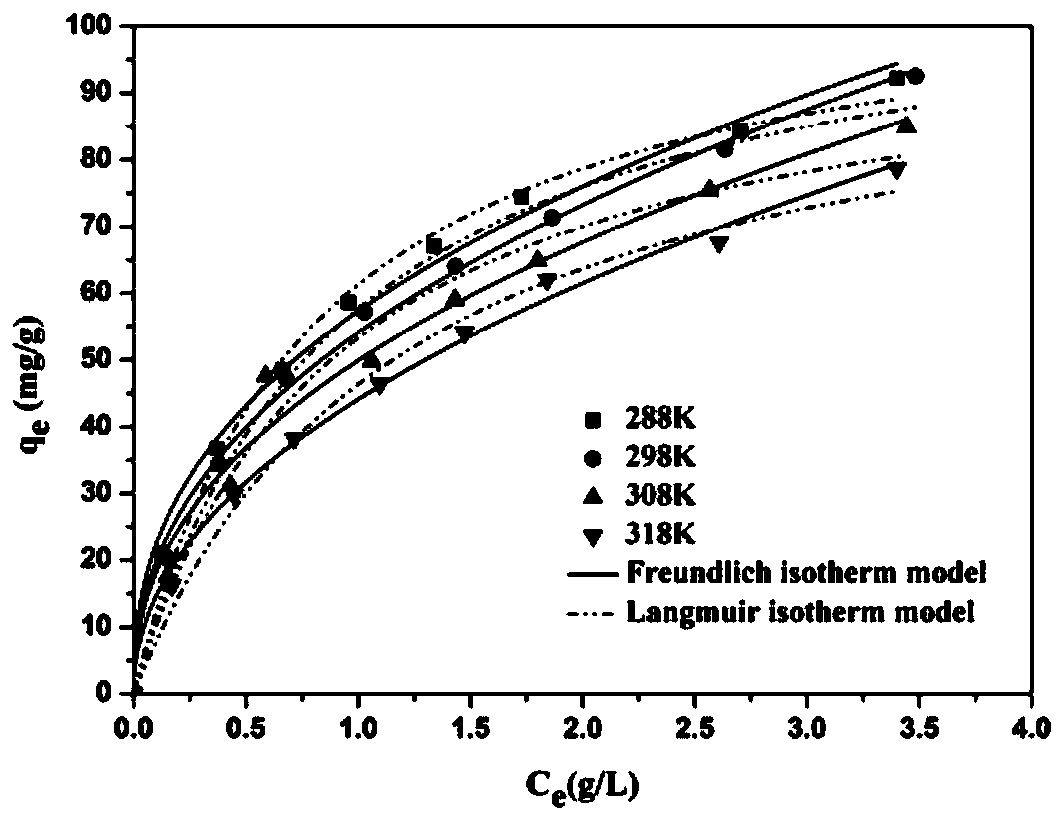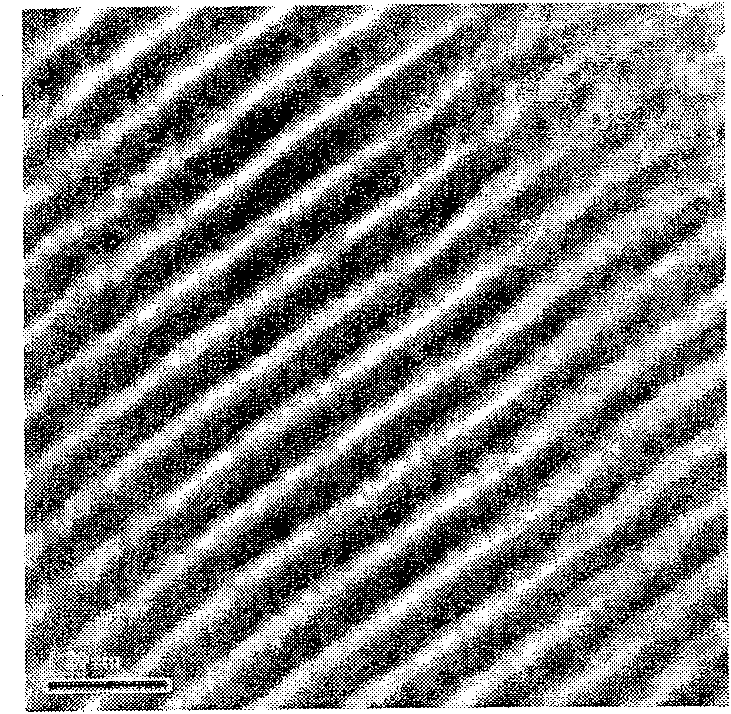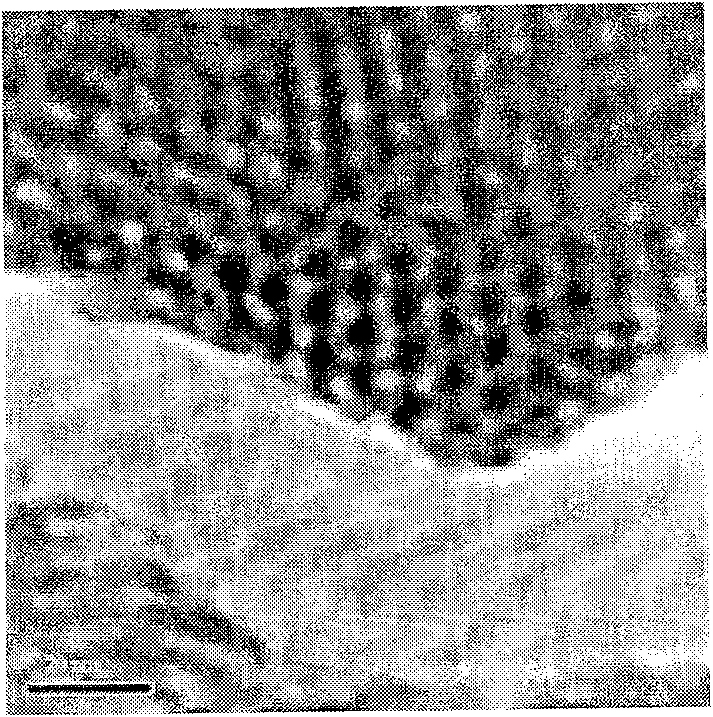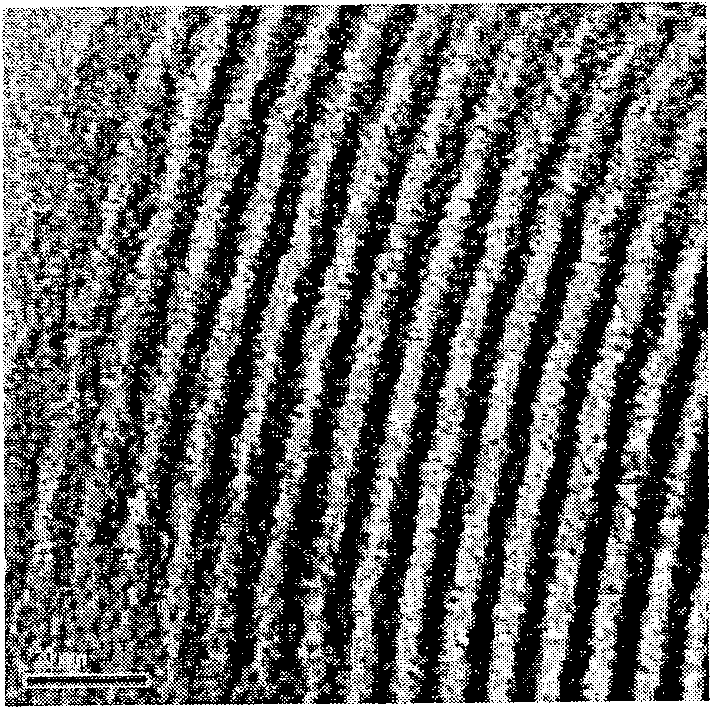Patents
Literature
31results about How to "Rich in hydroxyl" patented technology
Efficacy Topic
Property
Owner
Technical Advancement
Application Domain
Technology Topic
Technology Field Word
Patent Country/Region
Patent Type
Patent Status
Application Year
Inventor
Manganese bioxide/carbon nano tube composite adsorbent and its preparing method
InactiveCN1935355AImproved ability to remove organic matterLarge specific surface areaOther chemical processesCarbon nanotubeAqueous solution
The present invention provides a manganese dioxide / carbon nano tube composite adsorbing agent. Said adsorbing agent includes manganese dioxide and carbon nano tube, the manganese dioxide can be adsorbed on the carbon nano tube, the manganese dioxide content is 10%-40% of total mass. Besides, said invention also provides its preparation method and its concrete steps.
Owner:SHANDONG UNIV
Ordered organic-inorganic hybrid mesoporous silica and loaded gold nanomaterials, and preparing method thereof
ActiveCN101011668ASimple reaction preparationSmall particle sizeOrganic-compounds/hydrides/coordination-complexes catalystsMetal/metal-oxides/metal-hydroxide catalystsDielectricMesoporous silica
The invention discloses a sequent organic-inorganic hybridized dielectric silica and loaded nanometer gold material and making method, which is characterized by the following: blending n-ethyl orthosilicate and one organic functional siloxane primer with imidazole ionic liquid of thioether; synthesizing hybridized organic-inorganic dielectric silica material with imidazole ionic liquid of thioether under certain temperature; utilizing rich hydroxy on the channel surface to reduce HAuCl4 directly.
Owner:CHINA TOBACCO HUNAN INDAL CORP
Safe and simple method for preparing double-doped nitrogen and phosphor carbon quantum dots
ActiveCN108753283AFast preparationAvoid high temperature and high pressure reaction conditionsNanoopticsFluorescence/phosphorescencePhosphoric acidImpurity
The invention discloses a safe and simple method for preparing double-doped nitrogen and phosphor carbon quantum dots. In the method, firstly, amino acid and a carbon pre-cursor are dissolved in deionized water, a phosphoric acid solution is added, and a settled solution is prepared through stirring; then, the mixed solution is placed into an ultrasonic machine to be treated, wherein ultrasonic time is 1-2 h; the solution after ultrasonic treatment is heated for 1-5 hours in an oil bath at the temperature of 90-150 DEG C, and a nitrogen and phosphor co-doped carbon dot solution is prepared andcooled until room temperature is reached; large-particle impurities in the solution are removed through centrifuging, then dialysis is performed in a dialysis bag, and non-reaction raw materials andother small-particle impurities are removed. The raw materials are safe and free of toxin, conditions are mild, and the process is simple; by changing the type of amino acid and adjusting the ratio ofthe raw materials, the carbon quantum dots capable of emitting blue, green, yellow or orange red light can be obtained, and can be applied to the fields of bioimaging, ion detecting and others.
Owner:SOUTH CHINA UNIV OF TECH
Preparation method and application of Fe-Ti binary oxide adsorbent for removal of antimony
ActiveCN108262002AReduce energy consumptionLow costOther chemical processesWater contaminantsIron saltsSorbent
Belonging to the field of heavy metal polluted water treatment, the invention discloses a preparation method and application of an Fe-Ti binary oxide adsorbent for removal of antimony. The adsorbent adopts an iron salt and a titanium salt as the raw materials, pH regulation, co-precipitation, ultrasonic dispersion, ageing, centrifugation, washing, drying, grinding, and sieving are carried out to obtain the Fe-Ti binary oxide adsorbent. The adsorbent combines the advantages of iron oxide and titanium oxide, has a lot of rough micro-adsorption channels and a large specific surface area, containsrich hydroxyl on the surface, has fast adsorption speed and high adsorption capacity, and can achieve collaborative adsorption of antimony in wastewater selectively. The adsorbent prepared by the method provided by the invention can be applied to deep purification and safety control of antimony in wastewater.
Owner:BEIJING NORMAL UNIVERSITY
Microbe-assembly-synthesis-based arsenic polluted soil restoring and fixing agent, and preparation and application methods thereof
ActiveCN105733593AImprove adsorption capacityPH has little effectContaminated soil reclamationOrganic fertilisersIron saltsArsenic pollution
The invention discloses a microbe-assembly-synthesis-based arsenic polluted soil restoring and fixing agent, and preparation and application methods thereof. Many iron-base materials for arsenic polluted soil restoration at present influence the structural properties of the soil due to the introduction of abundant exogenous iron, and the iron salt fixing agent can easily acidify the soil after being applied, thereby restricting the development of the soil restoring and fixing agent in the aspect of soil restoration. In order to solve the problems above, nano alpha-Fe2O3 is used as a central substance and coated by mycelial fungus hypha to prepare the restoring and fixing agent for arsenic polluted soil. When the synthesized product is proportionally and uniformly mixed with soil, after seven days, the fixing rates for water-soluble arsenic and effective-state arsenic in the arsenic polluted soil respectively reach 83.2% and 96.4%. The fixing agent has the advantages of simple preparation process, high efficiency, no toxicity or harm and no secondary pollution, is biodegradable, can not destroy the physicochemical properties of the soil, and thus, is an environment-friendly fixing agent.
Owner:CENT SOUTH UNIV
Machine-made sand regulator for concrete, concrete and preparation method thereof
The invention relates to the technical field of building materials, and discloses a machine-made sand regulator for concrete, which comprises polycarboxylic acid mother liquor, diethanolisopropanolamine, triisopropanolamine, glycerol and sodium sulfate. Water is used as a solvent. The machine-made sand regulator disclosed by the embodiment of the invention has rich hydroxyl, is weakly alkaline, does not contain chloride ions, is non-toxic and non-corrosive, and is a high-performance green and environment-friendly material. The components are simple, and the excellent performance is achieved byregulating and controlling the reasonable ratio of the components. By using the machine-made sand regulator as an admixture of concrete, all sand in the concrete can adopt machine-made sand. No wasteliquid is generated, no cleaning is needed after stirring, no production wastewater is generated, and no waste gas is generated. The invention further discloses concrete and a preparation method thereof.
Owner:广州砼奇杰建材科技有限公司
Iron-based biochar material as well as preparation and application thereof
ActiveCN105733588AHigh adsorption capacityReduce manufacturing costContaminated soil reclamationOrganic fertilisersToxicityWater soluble
The invention discloses an iron-based biochar material as well as preparation and application thereof. In the invention, by adopting nano alpha-Fe2O3 as a center substance and wrapping the nano alpha-Fe2O3 with aspergillus niger hyphe, the iron-based biochar material for arsenic-polluted soil remediation is prepared through anoxic high-temperature carbonization. The synthesized iron-based biochar material is uniformly mixed with soil according to certain proportion; and after a period of time, the fixed rate of the water-soluble state arsenic and effective-state arsenic in the arsenic-polluted soil reaches 59.6% and 66.2% respectively. The iron-based biochar material disclosed by the invention has the advantages of easiness in preparation, high efficiency without toxicity, biodegradability and no secondary pollution or damage of physicochemical properties of soil and is an environment-friendly fixing agent.
Owner:CENT SOUTH UNIV
Process for treating heavy metal wastewater
InactiveCN109592738AShort timeImprove adsorptionWater contaminantsWater/sewage treatment by flocculation/precipitationTreatment effectHeavy metals
The invention provides a process for treating heavy metal wastewater, which can realize heavy metal wastewater treatment in a relatively short time by preparing a magnetic treatment preparation. By adopting the process, after solid and liquid are separated, effluent can achieve the national drainage standard and can be directly drained, sludge is electrolyzed to realize heavy metal reclamation, the used treatment preparation can be separated by utilizing a magnetic separation method, and the treatment preparation can be recycled after regeneration (the heavy metal wastewater treatment effect is not remarkably reduced when the treatment preparation is used repeatedly for more than 1000 times). The process is applicable to heavy metal wastewater treatment, has short time consumption, enableseffluent to accord with the national drainage standard, can realize heavy metal reclamation, and accords with the concept of environmental friendliness.
Owner:长沙如洋环保科技有限公司
Method for preparation of surface active onion-like carbon nanospheres based on vapor deposition
ActiveCN110255626AImprove thermal stabilityHigh purityMaterial nanotechnologyCarbon compoundsAlkaneGas phase
The invention discloses a method for preparation of surface active onion-like carbon nanospheres based on vapor deposition. The method includes: taking liquid small organic molecule alkane n-dodecane as the carbon source, carrying out chemical vapor deposition reaction at a high temperature of 650-700DEG C in an inert carrier gas environment with the existence of a ferrocene catalyst to directly prepare the high surface activity onion-like carbon nanospheres composed of onion-like graphitized shell coated ferroferric oxide nanoparticles. The onion-like carbon nanosphere product prepared by the method provided by the invention has good surface activity, thermal stability and wide practicability, and can be applied to adsorption materials, energy storage materials, catalytic materials, medical materials, and other fields.
Owner:TAIYUAN UNIV OF TECH
Manganese dioxide nanoflower and silicon oxide nanofiber compounding type catalyst and preparation method thereof
ActiveCN107456963AImprove adsorption capacityHigh catalytic activityMaterial nanotechnologyWater treatment compoundsFiberPersulfate
The invention discloses a manganese dioxide nanoflower and silicon oxide nanofiber compounding type catalyst and a preparation method thereof. The manganese dioxide nanoflower and silicon oxide nanofiber compounding type catalyst contains 30wt% to 60wt% of manganese dioxide nanoflower. The preparation method comprises the following steps of using the silicon oxide nanofiber as a carrier, using potassium permanganate as a manganese source, using persulfate as an oxidant, performing low-temperature hydrothermal reaction to produce the manganese oxide nanoflower, and loading the manganese oxide nanoflower onto the surface of the silicon oxide nanofiber, so as to obtain the manganese dioxide nanoflower and silicon oxide nanofiber compounding type catalyst. The manganese dioxide nanoflower and silicon oxide nanofiber compounding type catalyst has the advantages that the dispersivity in water is good, the fixing and forming are easy, the adsorbing ability is strong, the catalyzing activity is high, and the like; the process of the preparation technology is short, the operation is simple, the production efficiency is high, the energy consumption is low, the requirement on equipment is low, and the industrialized production is easily realized.
Owner:CENT SOUTH UNIV
Alcohol wastewater treatment technology
InactiveCN109879391AHigh removal rateGood flocculation effectWater contaminantsWaste water treatment from food industryChemistryMolecular sieve
The invention discloses an alcohol wastewater treatment technology. The alcohol wastewater treatment technology comprises the following operation steps: (1) after removing relatively large impuritiesfrom alcohol wastewater through a grille, conveying the alcohol wastewater into an adjusting tank; (2) then lifting the alcohol wastewater through a pump into a primary sedimentation tank and carryingout pre-treatment; adding an alcohol wastewater treatment agent; (3) then conveying the wastewater into a hydrolytic acidification tank and a contact oxidization tank and carrying out biochemical treatment; conveying output water into a secondary sedimentation tank and carrying out mud-water separation, wherein the alcohol wastewater treatment agent is prepared from: Powdered carbon, ferric sulfate, ammonium chloride, aluminum chloride, hydrogen peroxide, a zeolite molecular sieve, iron powder, formic acid, polyacrylamide, sucrose acetate, tartaric acid and sodium caseinate. According to thealcohol wastewater treatment technology disclosed by the invention, the tartaric acid, the sodium caseinate and the sucrose acetate are used as a reinforcing system, so that a flocculation capabilityof the alcohol wastewater treatment technology is improved and the removing rate of dissolved matters of organic matters is improved.
Owner:长沙如洋环保科技有限公司
A kind of iron-based biochar material and its preparation and application
ActiveCN105733588BImprove adsorption capacityAvoid the defects that are easy to flow away with waterContaminated soil reclamationOrganic fertilisersCarbonizationAspergillus niger
Owner:CENT SOUTH UNIV
Preparation method and application of Fe-Cu binary oxide adsorbent for removing antimony
InactiveCN108295804AReduce energy consumptionLow costOther chemical processesWater contaminantsSorbentCopper oxide
The invention discloses a preparation method and application of an Fe-Cu binary oxide adsorbent for removing antimony. The adsorbent uses ferric salt and cupric salt as raw materials; a solution containing Fe ions and a solution containing Cu ions are mixed; then, full stirring is performed; a NaOH solution is used for regulating the pH; through coprecipitation, ultrasonic dispersion, aging, centrifugation, washing, drying, grinding and sieving, the Fe-Cu binary oxide adsorbent is obtained. The preparation process of the adsorbent is simple; high temperature and high pressure are not needed; the energy consumption is low; the conditions are easily controlled; the risk is low; the raw material cost is low. The adsorbent combines the advantages of ferric oxides and copper oxides; the adsorbent has many coarse micro adsorption pore passages and large specific surface areas; the surface has rich hydroxy; the cooperative adsorption capability on antimony is improved. The adsorbent can be applied to deep purification and safe control of antimony in wastewater.
Owner:BEIJING NORMAL UNIVERSITY
Phase-change nanocapsule composite material with enhanced heat conductivity as well as preparation method and application of phase-change nanocapsule composite material
PendingCN114774086ALarge heat transfer specific surface areaHeat storageHeat-exchange elementsNanocapsulesPrepolymer
The invention discloses a heat-conduction-enhanced phase-change nanocapsule composite material as well as a preparation method and application thereof. The heat conduction enhanced phase change nanocapsule composite material is prepared from the following raw materials in percentage by mass: 10.53 percent to 26.09 percent of inorganic shell phase change nanocapsules, 26.09 percent to 31.58 percent of high heat conduction filler, 43.47 percent to 52.63 percent of polydimethylsiloxane prepolymer and 4.35 percent to 5.26 percent of a curing agent. Dispersibility of the phase-change nanocapsule and the high-thermal-conductivity filler in a matrix is enhanced jointly through solvent assisted dispersion and intermittent feeding, so that the material has higher thermal conductivity and thermal storage capacity. The inorganic shell phase change nanocapsule enables the hardness of the polydimethylsiloxane-based composite material to be reduced, so that the composite material is more favorable for being attached to an interface. The material is used as a thermal interface material and is expected to fill air gaps, relieve thermal shock of a chip under high heat flux density and help the chip, an electronic device and the like to dissipate heat better.
Owner:SOUTH CHINA UNIV OF TECH
Method for preparing surface-active onion-like carbon nanospheres based on vapor deposition
ActiveCN110255626BRich in hydroxylAbundant carbonylMaterial nanotechnologyCarbon compoundsAlkaneDodecane
Owner:TAIYUAN UNIV OF TECH
A Safe and Simple Method for Double-doped Nitrogen and Phosphorus Carbon Quantum Dots
ActiveCN108753283BExcellent fluorescence performanceWide range of incoming materialsNanoopticsFluorescence/phosphorescenceO-Phosphoric AcidAmino acid
The invention discloses a safe and simple method for preparing double-doped nitrogen and phosphor carbon quantum dots. In the method, firstly, amino acid and a carbon pre-cursor are dissolved in deionized water, a phosphoric acid solution is added, and a settled solution is prepared through stirring; then, the mixed solution is placed into an ultrasonic machine to be treated, wherein ultrasonic time is 1-2 h; the solution after ultrasonic treatment is heated for 1-5 hours in an oil bath at the temperature of 90-150 DEG C, and a nitrogen and phosphor co-doped carbon dot solution is prepared andcooled until room temperature is reached; large-particle impurities in the solution are removed through centrifuging, then dialysis is performed in a dialysis bag, and non-reaction raw materials andother small-particle impurities are removed. The raw materials are safe and free of toxin, conditions are mild, and the process is simple; by changing the type of amino acid and adjusting the ratio ofthe raw materials, the carbon quantum dots capable of emitting blue, green, yellow or orange red light can be obtained, and can be applied to the fields of bioimaging, ion detecting and others.
Owner:SOUTH CHINA UNIV OF TECH
Preparation and application of a kind of porous organic polymer
ActiveCN107325231BRich in hydroxylImprove hydrophilicityIon-exchange process apparatusIon-exchanger regenerationCross-linkPolymer science
The invention discloses a preparation method and application of a polydopamine modified polystyrene-ethylene glycol dimethacrylate porous organic polymer. The preparation method comprises the steps of preparing polydopamine modified polystyrene-ethylene glycol dimethacrylate, and preparing the polydopamine modified polystyrene-ethylene glycol dimethacrylate porous organic polymer. Polydopamine modified polystyrene-ethylene glycol dimethacrylate is prepared by virtue of a reverse micelle swelling method, styrene is taken as a monomer, ethylene glycol dimethacrylate is taken as a cross-linking agent, polyvinyl alcohol is taken as a pore-foaming agent, and finally, a porous organic polymer particles is synthesized. The polydopamine modified polystyrene-ethylene glycol dimethacrylate porous organic polymer is prepared through coating and modification of polydopamine, and the hydrophilic performance, mechanical property and adsorption performance to biomacromolecules such as polypeptides, proteins and polysaccharides of the porous organic polymer are obviously improved.
Owner:云南油橄榄大健康产业创新研究发展有限公司
A kind of composite catalyst of manganese dioxide nanoflower and silica nanofiber and preparation method thereof
ActiveCN107456963BImprove adsorption capacityHigh catalytic activityMaterial nanotechnologyWater treatment compoundsPtru catalystPersulfate
The invention discloses a catalyst composed of manganese dioxide nanoflowers and silica nanofibers and a preparation method thereof. The content of manganese dioxide nanoflowers in the catalyst is 30 wt% to 60 wt%. The preparation method is: Silicon oxide nanofibers are used as carriers, potassium permanganate is used as the manganese source, and persulfate is used as the oxidant. Through low-temperature hydrothermal reaction, manganese oxide nanoflowers are produced and loaded on the surface of the silicon oxide nanofibers to form manganese dioxide nanoflowers and silicon oxide. Nanofiber composite catalyst. The composite catalyst of manganese dioxide nanoflowers and silica nanofibers in the present invention has outstanding advantages such as good dispersion in water, easy fixation and molding, strong adsorption capacity and high catalytic activity. The preparation process of the invention is short, simple to operate, high in production efficiency, low in energy consumption, low in equipment requirements, and easy to realize industrial production.
Owner:CENT SOUTH UNIV
A kind of gold-based catalyst, its preparation method and application
ActiveCN111905758BEvenly dispersedFast and Stable RestoreOrganic chemistryOrganic compound preparationPtru catalystMeth-
Owner:XIAMEN UNIV
Preparation method of silicon dioxide modified porous polyvinyl alcohol non-woven fabric
PendingCN111993724AEvenly distributedRich in hydroxylLamination ancillary operationsFibre typesSpinningPolyvinyl alcohol
The invention provides a preparation method of a silicon dioxide modified porous polyvinyl alcohol non-woven fabric. The method comprises the following steps: adding polyvinyl alcohol powder into deionized water, and carrying out heating to dissolve to obtain a polyvinyl alcohol solution; adding a precursor of silicon into deionized water, uniformly mixing, adding a polyethylene glycol solution, continuously and uniformly stirring the solution, dropwise adding hydrochloric acid to adjust the pH value of the system to be acidic, and stirring the solution for reaction while dropwise adding polyethylene glycol to obtain a silicon dioxide modified polyvinyl alcohol solution; adding aminated silicon dioxide sol into the silicon dioxide modified polyvinyl alcohol solution to form a spinning solution, and performing electrostatic spinning to prepare a silicon dioxide modified polyvinyl alcohol fiber membrane; putting the silicon dioxide modified porous polyvinyl alcohol fiber membrane betweentwo pieces of base cloth, and needling to obtain a silicon dioxide modified polyvinyl alcohol non-woven fabric; and treating the silicon dioxide modified polyvinyl alcohol non-woven fabric with ethanol, and soaking the treated polyvinyl alcohol non-woven fabric into a potassium hydroxide solution and carrying out heating to obtain the silicon dioxide modified porous polyvinyl alcohol non-woven fabric.
Owner:武汉智达纺织科技有限公司
Cellulose nanofiber and preparation method thereof
ActiveCN113668084AReduce consumptionRaw materials are widely availableNanotechnologyArtificial filaments from cellulose derivativesAlkaline waterLithium hydroxide
The invention provides a preparation method of cellulose nanofiber. The preparation method comprises the following steps of 1) dispersing cellulose in a first organic solvent to prepare a cellulose dispersion liquid; 2) adding lithium hydroxide into the cellulose dispersion liquid obtained in the step (1) to fully swell the cellulose; 3) reacting the fully swollen cellulose obtained in the step (2) with anhydride, and washing reaction liquid to obtain a cellulose reaction product; and 4) dispersing the cellulose reaction product obtained in the step 3) in an alkaline aqueous solution, performing centrifuging, and dialyzing a supernate to obtain a suspension containing the cellulose nanofiber. According to the preparation method, the raw materials are wide and easy to obtain, only simple and mild magnetic stirring is needed, the whole process can be carried out at room temperature, the reaction condition is mild, and the cost is low. The length-diameter ratio of the prepared cellulose nanofiber is greater than 800, and the cellulose nanofiber has higher modifiability and excellent mechanical properties.
Owner:WUHAN UNIV
A carbon nitride/lanthanum hydroxide nanofiber membrane and its preparation method and application
ActiveCN112076785BAvoid reunionEasy to separateHydrogen peroxideWater/sewage treatment by irradiationFiberElectrospun nanofibers
The invention provides a carbon nitride / lanthanum hydroxide nanofiber membrane, a preparation method and application thereof. Combining nanofiber loading and the characteristics of lanthanum electron-deficient orbitals, electrospun nanofiber membranes are used as scaffolds to load carbon nitride to prevent carbon nitride agglomeration, increase its specific surface area, and grow hydrogen in situ on carbon nitride sheets Lanthanum oxide, using the unique electron-deficient orbital structure of lanthanum hydroxide, promotes the separation of photogenerated electrons and holes in carbon nitride, thereby improving the photocatalytic activity. In the prepared carbon nitride / lanthanum hydroxide nanofiber membrane, carbon nitride and lanthanum hydroxide are wrapped in nanofibers, and lanthanum hydroxide nanosheets are grown on the carbon nitride sheet in situ. The prepared carbon nitride / lanthanum hydroxide nanofiber membrane can be used for catalytic degradation of dyes and catalytic hydrogen production under visible light. The invention solves the problems of easy agglomeration of carbon nitride, cumbersome post-treatment, low utilization rate of visible light and the like.
Owner:SICHUAN UNIV
High-strength anti-yellowing rubber
InactiveCN110305373AImprove mechanical propertiesImprove vulcanization effectRubber materialPolymer science
The invention discloses high-strength anti-yellowing rubber. The high-strength anti-yellowing rubber comprises the following components: 70-90 parts of natural rubber, 10-30 parts of butadiene rubberBR9000, 3.5-6 parts of zinc carbonate, 1-2 parts of stearic acid, 1-2 parts of an anti-aging agent BHT, 0.3-0.8 part of an accelerator NS, 1-2 parts of an anti-yellowing promoter ZDTP-50, 4-6.5 partsof polyethylene glycol, 35-55 parts of white carbon black, 25-35 parts of titanium dioxide, 0.8-2 parts of a coupling agent Si69-50, 5-10 parts of a vulcanizing agent, 15-35 parts of white mineral oil, wherein the vulcanizing agent is a sulfur dichloride-loaded mesoporous molecular sieve. The high-strength anti-yellowing rubber is prepared mainly from the natural rubber and butadiene rubber, and the whole yellowing resistance is improved through addition of the anti-yellowing promoter ZDTP; and sulfur dichloride as a key to the high-strength anti-yellowing rubber is loaded on the mesoporous molecular sieve, vulcanization is achieved on the one hand, vulcanization can also be promoted on the other hand, and the mechanical properties of the rubber material are also improved.
Owner:浙江中瑞橡胶高分子材料股份有限公司
An active filter material for manganese removal by catalytic oxidation in a water purification plant and its preparation method
InactiveCN107285451BPotassium permanganate fast preparation speedFast productionWater contaminantsWater/sewage treatment by oxidationEtchingCatalytic oxidation
The invention belongs to the technical field of drinking water treatment processes and specifically provides an active filter material for removing manganese by catalytic oxidation in a water treatment plant and a preparation method thereof. The method comprises the following steps: etching coarse quartz sand under acidic and alkaline conditions respectively; then oxidizing bivalent Mn<2+> into manganese oxide hydrate under a room-temperature reaction condition by utilizing KMnO4 and loading the manganese oxide hydrate on a quartz sand filter material. According to the preparation method provided by the invention, prepared oxide has very thin granularity and has a colloidal state; under a weak alkaline condition, the oxide is very easily attached to the surface of the quartz sand subjected to acid and alkali etching; the method is operated at room temperature and a product has abundant surface hydroxyls and good catalytic activity; when the product is used for treating source water with the average inlet water Mn<2+> concentration of 0.56mg / L, the average manganese removal rate reaches 90.4 percent. The active filter material provided by the invention is used for preparing an active filter membrane with a manganese catalytic oxidation capability; the preparation method is relatively simple and easy to operate and the filter material obtained by the preparation method has relatively good Mn<2+> catalytic oxidation activity.
Owner:HEFEI WATER SUPPLY GRP CO LTD +1
A kind of preparation method and application of fe-ti binary oxide adsorbent for removing antimony
ActiveCN108262002BReduce energy consumptionLow costOther chemical processesWater contaminantsIron saltsSorbent
The invention discloses a preparation method and application of an Fe-Ti binary oxide adsorbent for removing antimony, and belongs to the field of treatment of heavy metal polluted water bodies. The adsorbent of the present invention uses iron salt and titanium salt as raw materials, adjusts pH, co-precipitates, ultrasonically disperses, ages, centrifuges, washes, dries, grinds, and sieves to obtain the FeTi binary oxide adsorbent. The adsorbent combines the advantages of iron oxide and titanium oxide, has many rough microscopic adsorption pores and a large specific surface area, the surface contains abundant hydroxyl groups, fast adsorption speed, high adsorption capacity, and can selectively and synergistically adsorb wastewater Antimony in. The adsorbent of the invention can be applied to deep purification and safety control of antimony in waste water.
Owner:BEIJING NORMAL UNIVERSITY
Cellulose nanofibers and preparation method thereof
ActiveCN113668084BReduce consumptionRaw materials are widely availableNanotechnologyArtificial filaments from cellulose derivativesAlkaline waterPolymer science
The present invention provides a method for preparing cellulose nanofibers, comprising the following steps: Step 1): dispersing cellulose in a first organic solvent to prepare a cellulose dispersion; Step 2): adding the fibers obtained in step 1) to Lithium hydroxide is added to the cellulose dispersion to fully swell the cellulose; step 3): react the fully swollen cellulose obtained in step 2) with an acid anhydride, wash the reaction solution, and obtain a cellulose reaction product; step 4): the step 3) The obtained cellulose reaction product is dispersed in an alkaline aqueous solution, centrifuged, and the supernatant is dialyzed to obtain a suspension containing cellulose nanofibers. The preparation method provided by the invention has wide and readily available raw materials, only needs simple and mild magnetic stirring, the whole process can be carried out at room temperature, the reaction conditions are mild, and the cost is low. The prepared cellulose nanofibers have an aspect ratio of >800, higher modifiability and excellent mechanical properties.
Owner:WUHAN UNIV
Machine-made sand conditioner for concrete, concrete and preparation method thereof
This application relates to the technical field of building materials, and discloses a machine-made sand conditioner for concrete, including: polycarboxylic acid mother liquor, diethanol monoisopropanolamine, triisopropanolamine, glycerin and sodium sulfate; the solvent is water . The machine-made sand conditioner of the embodiment of the present disclosure has abundant hydroxyl groups, is weakly alkaline, does not contain chloride ions, is non-toxic and non-corrosive, and is a high-performance green environmental protection material. The composition is simple, and the excellent performance can be achieved by adjusting the reasonable ratio of the components. As an admixture for concrete, machine-made sand can be used as the sand material in concrete. No waste liquid is generated, no cleaning is required after stirring, no production wastewater is generated, and no waste gas is generated. The application also discloses a concrete and a preparation method thereof.
Owner:广州砼奇杰建材科技有限公司
Gold-based catalyst, and preparation method and application thereof
ActiveCN111905758AEvenly dispersedFast and Stable RestoreOrganic chemistryOrganic compound preparationPtru catalystAlloy catalyst
The invention provides a gold-based catalyst and a preparation method thereof, and the application of the gold-based catalyst in MDA preparation reactions. The gold-based catalyst is characterized inthat the gold-based catalyst comprises a carrier, and an active component and an auxiliary agent which are loaded on the carrier, wherein the carrier is hydroxide of aluminum; the active component isgold, and the content of the active component is 0.1-10 wt.%; and the auxiliary agent is iron, or iron and iron oxide. With the gold-based catalyst, in the process of preparing methylacrolein dimethylacetal from methanol, methylacrolein and oxygen as raw materials, the conversion rate of methylacrolein can reach 80% or above, and MDA selectivity is up to 90% or above; and compared with the priorart, the yield of MDA is greatly increased, and large-scale industrial preparation of MDA is realized.
Owner:XIAMEN UNIV
Macroporous phenolic resin, preparation method thereof and application thereof in adsorption of 5-hydroxymethyl furfural
ActiveCN109939657ALarge specific surface areaImprove adsorption capacityIon-exchange process apparatusOrganic chemistryHydrogenWastewater
The invention provides a macroporous phenolic resin and a preparation method thereof, an application thereof in adsorption of 5-hydroxymethyl furfural. The macroporous phenolic resin has the BET specific surface area of 400-1300 m <2> / g, the pore volume of 0.3-1.5 cm <3> / g, and the average pore diameter of 1-20 nm. The macroporous phenolic resin has the advantages of high specific surface area, high adsorption capacity and high adsorption selectivity; the rich pore structure is regenerated and recycled easily; the macroporous phenolic resin has rich hydroxyl functional groups, and the adsorption capacity of 5-hydroxymethyl furfural is greatly improved through hydrogen bonding and hydrophobic interaction, wherein the maximum adsorption capacity can reach 111 mg / g wet resin, and the elutionyield of the 5-hydroxymethyl furfural is more than 99.5 percent; high efficiency separation of the 5-hydroxymethyl furfural can be achieved. The macroporous phenolic resin is applied to adsorption separation of the 5-hydroxymethyl furfural, does not generate waste water, and can greatly shorten the primary concentration time of the 5-hydroxymethyl furfural, thereby achieving green separation.
Owner:GUANGDONG UNIV OF TECH
Ordered organic-inorganic hybrid mesoporous silica and loaded gold nanomaterials, and preparing method thereof
ActiveCN100556543CLarge apertureRich in hydroxylOrganic-compounds/hydrides/coordination-complexes catalystsMetal/metal-oxides/metal-hydroxide catalystsDielectricMesoporous silica
Owner:CHINA TOBACCO HUNAN INDAL CORP
Features
- R&D
- Intellectual Property
- Life Sciences
- Materials
- Tech Scout
Why Patsnap Eureka
- Unparalleled Data Quality
- Higher Quality Content
- 60% Fewer Hallucinations
Social media
Patsnap Eureka Blog
Learn More Browse by: Latest US Patents, China's latest patents, Technical Efficacy Thesaurus, Application Domain, Technology Topic, Popular Technical Reports.
© 2025 PatSnap. All rights reserved.Legal|Privacy policy|Modern Slavery Act Transparency Statement|Sitemap|About US| Contact US: help@patsnap.com
